#the story amidst the chaos is very good its making me insane
Explore tagged Tumblr posts
Text
finished ultrakill. I need gabriel
#ultrakill#IM SO LATE#BUT I GET IT NOW#also oh my god does it like smooth my brain whenm iplay it or soemthing#i didnt blink for like five minutes i needed to grab my eyedrops#but i get it now#its so!#the story amidst the chaos is very good its making me insane#houhghgk
23 notes
·
View notes
Text
Black Sails’ Toby Stephens on Captain Flint and the Final Season
Black Sails will return to Starz on January 29, 2017 for its fourth and final season. When we last left the pirates, Captain Flint (Toby Stephens) was beginning the revolution in Nassau and Long John Silver’s (Luke Arnold) star was rising. We recently got a chance to chat with Toby Stephens about the end of the series, what’s coming for Flint and working on this epic show. Check out his thoughts on season four below!
Here is the official synopsis:
The fourth season opens with hundreds of British soldiers dead in a forest… the Royal Navy sails back to England in retreat… the West Indies are now a war zone, and the shores of New Providence Island have never been bloodier. With the help of Eleanor Guthrie, Woodes Rogers transforms Nassau into a fortress without walls, as Captain Flint amasses a fleet of unprecedented strength, hoping to strike the final blow against civilization and reshape the world forever. Meanwhile, from within the island… an insurgency builds, fueled by the legend of its exiled leader, whose name keeps grown men awake at night… the one they call “Long John Silver.”
But as Flint, Silver and their allies are about to learn, the closer civilization comes to defeat, the more desperately and destructively it will fight back. Oaths will be shattered, fortunes will change hands, and amidst the chaos, only one thing remains certain: it has never been more dangerous to call oneself a pirate.
xxxx
Legion of Leia: I was in South Africa on the set when you were filming that crazy storm sequence in season three. What sort of set pieces are we going to see this time around?
Toby Stephens: It’s huge. There’s loads of stuff that will keep fans extremely happy, I’m sure.
Legion of Leia: Flint had a crazy few seasons. I’m curious about whether or not you think his destiny was set with Miranda’s (Louise Barnes) death.
Toby Stephens: I think yes, it kind of compounded the way he was going. I mean, I think before Miranda died, maybe people could reason him out of certain choices, but I think when Miranda dies, that’s the last nail in the coffin in terms of him going after England in this relentless way. And also, I would say, the other thing that compounds it is finding an ally in Silver. The fact that they become partners in this enterprise, it seems that Flint can only function when he has somebody who he’s allied with or is an alter-ego for him. Someone who can balance him and he can work through. So that is both good for him and bad for him in a way.
Legion of Leia: In the last episode, there is that conversation between Flint and Silver where they’re like, oh, we’re friends. But bad things happen to Flint’s friends. We know a bit about where this is going to go because of “Treasure Island.” What’s ahead for Flint here?
Toby Stephens: Yeah, well, I think it’s really the end game for the whole series, and we know it’s a tragedy because there was no great revolution in the pirate world. There was no emancipation of the pirates and the slaves. It didn’t happen, so why did it not happen and what happens to Flint at the end of that, when his dreams are crushed? What happens to Silver and him? How does that play out? And also, how does the Silver that we know become the eponymous Long John Silver of “Treasure Island?” How does that happen? And I think season four brilliantly leads us to a point where where, it’s a very satisfying ending, but also leaves you to fill in the gaps between there and “Treasure Island.” You kind of know who these people are at the end of this, but it’s a kind of really cool thing to allow people to do that themselves rather than go, look, this is what happens, all the way to the end. It leaves you to do some work yourself.
Legion of Leia: I love that. This show has sent me to Wikipedia more often than you would believe!
Toby Stephens: [laughs] I know!
Legion of Leia: How much research do you do for a role like this, or do you rely mostly on the script?
Toby Stephens: Do you know what? It’s a combination of laziness and there is method to it. I just go with what is in the script. I mean, like you, I’ll go to Wikipedia if I need to know something, if I don’t know what something is. But whether or not it has real historic context, for me is immaterial because I’m working in a fictive world. It’s a fictive world with dashes here or there of historic fact. A pinch here, a pinch there, and I need to work in that world, so it’s better if I stick there.
Legion of Leia: I did love seeing how much was actually built on the set and how many little touches were there, historical and fictive, both.
Toby Stephens: Yeah, what I love is the detail in terms of everybody else, the props, etc. There was a lot of care taken about what would have been there, what wouldn’t have been there, creating that texture of the world, where you can believe it.
Legion of Leia: When we were there, we were hearing stories of bugs in the walls!
Toby Stephens: We were always having problems with–there were these crickets. And they would get in. We would call them “sea crickets!” [laughs] You would be in a take and you would hear [makes cricket noises]. We’re supposed to be in the middle of something scene! [laughs] Or there would be birds up in the rigging going “cheep, cheep!” And you just go, oh my God, there’s another hour in ADR!
Legion of Leia: Did you have to do a ton of ADR?
Toby Stephens: Oh yeah! I have become the master of ADR. I breeze it now! I kind of like it because sometimes you can actually improve things. You know? There was a scene I did in the first season where it was with Gates (Mark Ryan), and it was a storm, and we’re having this conversation and we’re having a drink, and we’re on the set–it was the beginning when they used to gimbal the set. It was so noisy! There was water coming in, dripping everywhere. They wanted it to look authentic. Because it was quite a stressful set to be on [laughs], for some reason my [in a high-pitched voice] my voice was up here! I watched it–I mean, I had to loop it because there was so much noise there, but I thought, I sound like an hysteric! I managed to re-voice the whole thing and kind of couch it where Flint speaks normally. That’s a case in point where you can really improve on things.
Legion of Leia: I can’t imagine trying to speak clearly during some of those storm scenes!
Toby Stephens: I mean, it was mad! This job was amazing because I loved the people and I loved working on it, but there are aspects that I won’t miss. It was totally exhausting. By the end of this last season, I was literally hanging in rags, because it makes such demands on you. You’ve got enormous amounts of dialogue and enormous amounts of acting to do, and then at the same time, you’ve got all of this physical stuff to do, and it’s day in and day out. And you’re in the costumes and you’re in baking heat, and it was long, long days. No other job I would be able to do, in terms of acting–I mean, I’m not working in a coal mine–but there is no other job I could do that would come near this. It sort of made me immune to–it made everything else seem like a breeze. It was so arduous. And some of the stuff we did in season four, some of the stuff that I did towards the end, it was really difficult. Really difficult.
Legion of Leia: Having seen that storm scene and the tanks of water being dumped on you and the ship moving back and forth and the yelling–it was crazy!
Toby Stephens: Yeah, it was also the length of time it went on for. Because we also did two weeks straight, and then we kept on coming back for pickups because it was so particular. And also, it’s part of the reason why I’m so proud of the show, is that they had such exacting standards for what they wanted. They’d cut it together and realize they were missing bits, or that they could get bits better, but it was a drag. You had to get back on this deck and they were spraying you with stuff and they had the engines on. It was brutal. But you look at the end result and you go, that will stand. In ten years time, it will look amazing.
Legion of Leia: What are you going to miss the most, now that the show is over?
Toby Stephens: I think I’ll miss all the people that I worked with. One of the things about the job is, you create these very intense and very fun relationships with people, creative relationships with people, very creative, and then they dissolve and move on. I’ll miss that, and working with such great writers. John [Steinberg], Robert [Levine] and Dan [Shotz], you know, just brilliant writing, fantastic showrunners. They were so good and we had a really intense relationship. I’ll miss that.
Legion of Leia: What do you have coming up next?
Toby Stephens: So I just started doing the reinvention of Lost In Space for Netflix, so I literally just started working for them. I’m really excited for that. It’s a brilliant segue from one genre to another. [laughs] It’s a really fun reinvention of it. It’s really clever, and I’m really excited about it. I think this will be fun in terms of, it’s servicing fans, making a show for now.
Legion of Leia: Also, different costumes. Maybe not so much wool in the heat!
Toby Stephens: I think it will be differently uncomfortable. [laughs]
Legion of Leia: Those costumes were insane and it was so hot while you were filming.
Toby Stephens: Yeah, it was tough, and also in the brutal sun all day long. Standing on ships. It was killer. And the boots. I remember always complaining. I bitched and moaned about my boots all the time. [laughs] These things are killing me! Can you imagine these pirates going, “Jeeze, man! Couldn’t we have flip flops? Could we have a pair of thongs? Why do we have to wear these things?” [laughs]
Legion of Leia: I feel like pirates should have worn fewer clothes!
Toby Stephens: Yeah! [laughs] But apparently they didn’t. They didn’t, actually. The whole thing of pirates wearing all of that is baloney. They actually–they had very light shirts and stuff. Apparently they just didn’t wear much.
Legion of Leia: That was for fancy pirates.
Toby Stephens: And also, it was just for show. Also, what Black Sails kind of gets into is, a lot of it was p.r. It was p.r. by the English, because they wanted to demonize these people, but it was also their own p.r.–like Blackbeard having fuses on his beard and stuff like that. It was all to make people scared.
Legion of Leia: You can see that even with what Billy [Tom Hopper] is doing at the end of season three with Silver.
Toby Stephens: Yeah, and here’s a really fun thing. You get to the end of this season, and you take a screenshot of characters at the end of this season and you compare them to screenshots from the beginning of season one and they’re just like–the journey that they’ve been on, and the toll it’s taken on them is really cool. I mean, Luke just looks terrible at the end of it! And he was so beautiful at the beginning! [laughs] And the same with Tom Hopper who plays Billy Bones. You see he’s headed towards the Billy Bones of “Treasure Island.”
Legion of Leia: I wanted to ask you about Flint and Billy. There is such a tense relationship there with so much history. How is that going to shift this season?
Toby Stephens: Yeah, it really comes to a head. It comes to blows. They’re not going to be able to–it’s really interesting the way Billy goes, I think, in this season. It’s been a long time coming.
Legion of Leia: Do you think Flint has any of the idealism left that he had at the beginning?
Toby Stephens: Well, what’s really interesting at the end of it, one realizes how personal this is for Flint. And that, actually, it’s not really some altruistic scheme that he has to liberate everybody. He’s playing out his own psychodrama in reality. And how demented–how he will not stop. How it will go on and on and on. And somebody has to stop that. You know, it’s a tragedy because we know that there was no–it’s got to end somewhere. It’s not going to be good.
Legion of Leia: I do have to ask you about working with your family! [Toby’s wife Anna-Louise Plowman plays Mrs. Hudson and his brother Chris Larkin joined the cast as a Redcoat this season]
Toby Stephens: Yeah! It was wonderful, actually! It was so wonderful because I hadn’t spent so much time with my brother for a while. And was really great hanging out with him. And it was a bit strange. We had one scene where we were given direction to look at each other across–we had no lines together, but we had to look at each other across this town square. And I suddenly realized, this is really difficult because nobody on Earth knows me as well as my brother does. And to try and pretend with one another is just impossible! There cannot be any artifice! [laughs] So both of us, it was hopeless! I said, you look at my chest and I’ll look at your forehead. [laughs] It’s impossible! You can’t hide!
Are you guys excited for season four? Let us know in the comments! Black Sails will return to Starz on January 29, 2017.
sources: Legion of Leia (unfortunately I can't put link because it wasn't secured)
23 notes
·
View notes
Photo

The Story Behind Every Song On Will Butler’s New Album Generations
Will Butler has a lot on his mind. It has, after all, been five years since his solo debut, Policy. A lot can happen in half a decade, and a lot has happened in this past half-decade — much of it quite dire. Butler was in his early 30s when Policy came out, and now he’s closing in on 40. He’s a husband and father. And he’s shaken by the state of the world, the idea of being an artist and a soon-to-be middle-aged man striving to guide his family through the chaos.
At least, that’s how it comes across through much of Generations, his sophomore outing that arrives today. Generations is a big, sprawling title by nature, and the album in turn grapples with all kinds of big picture anxieties. Mass shootings, the overarching darkness and anxiety of our time, trying to reckon with our surroundings but the system overload that occurs all too easily in the wake of it. Then there are more intimate songs, too, tales drawn from personal lives as people plug along just trying to navigate a tumultuous era.
Butler is, of course, no stranger to crafting music that seeks to parse the cultural moment and how it impacts in our daily lives. Ever since Arcade Fire ascended to true arena-rock status on The Suburbs 10 years ago, they have embarked on projects that explicitly try to make sense of our surroundings. (Not that their earlier work was bereft of heavy concepts — far from it — but Reflektor and Everything Now turned more of a specific eye towards contemporary ills and trials.) But as one voice amongst many in Arcade Fire, there is a cinematic scope to whatever Butler’s playing into there.
On Generations, he engages with a lot of similar concerns but all in his own voice — often yelping, desperate, frustrated then just trying to catch a breath. Butler leans on his trusty Korg MS-20 throughout Generations, often giving the album a synth-y indie backdrop that allows him to try on a few different selves. There are a handful of surging choruses, “la-la” refrains batting back against the darkness, slinking grooves maybe allowing someone the idea of brief physical release amidst ongoing strife.
Ahead of Generations’ arrival, Butler sent us some thoughts on the album, running from inspiration between the individual tracks to little details about the arrangement and composition of different songs. Now that you can hear the album for yourself, check it out and read along with Butler’s comments below.
1. “Outta Here”
I think this is the simplest song on the record. Just, like, get me out of here. Get me fucking out of here. I’m so tired of being here. No, I don’t have another answer, and I don’t expect anything to be better anywhere else. But, please, I would like to leave here.
I can play plenty of instruments, and can make interesting sounds on them, but kinda the only instrument I’m good at is a synth called the Korg MS-20. That’s the first sound on the record. It makes most of the bass you hear on the record. It’s a very aggressive, loud, versatile machine, and I wanted to start the record with it cause I’m good at playing it and it makes me happy.
2. “Bethlehem”
This song partly springs from “The Second Coming” by William Butler Yeats: “What rough beast, its hour come round at last, slouches towards Bethlehem to be born?” Like a lot of folks, I woke up after the election in 2016 mad and sad and scared and exhausted. This song is born of that emotion.
My bandmates Jenny Shore, Julie Shore, and Sara Dobbs sing the bridge, and it’s a corrective to my (appropriate?) freaking out — this isn’t the apocalypse. You’re misquoting Yeats. Get your fucking head on straight. History has not ruptured — this shit we’re in is contiguous with the shit we’ve been dealing with for a long, long time. But still, we sometimes do need an apocalyptic vision to make change. Even if it’s technically wrong. I dunno. It’s an ongoing conversation.
There’s a lot of interplay with backing vocals on this record — sometimes the narrator is the asshole, sometimes the backing vocals are the asshole. Sometimes they’re just trying their best to figure out the world. This song starts that conversation.
3. “Close My Eyes”
I tried to make these lyrics a straightforward and honest description of an emotion I feel often: “I’m tired of waiting for a better day. But I’m scared and I’m lazy and nothing’s gonna change.” Kind of a sad song. Trying to tap into some Smokey Robinson/Motown feeling — “I’ve got to dance to keep from crying.”
There’s a lot of Mellotron on this record, and a lot of MS-20. This song has a bunch of Mellotron strings/choirs processed through the MS-20. It’s a trick I started doing on the Arcade Fire song “Sprawl II,” and I love how it sounds and I try to do it on every song if I can.
4. “I Don’t Know What I Don’t Know”
This makes a pair with “Close My Eyes” — shit is obviously fucked, but “I don’t know what I don’t know what I don’t know what I can do.” I’m not a proponent of the attitude! Just trying to describe it, as I often feel it. In my head, I know some things that I can do — my wife Jenny, for instance, works really hard to get state legislatures out of Republican control. Cause it’s all these weirdo state legislative chambers that have enormous power over law enforcement, and civil rights, and Medicaid, and everything.
The image in the last verse was drawn from the protests in Ferguson in 2015: “Watch the bullets and the beaters as they move through the streets — grab your sister’s kids — hide next to the fire station…” It’s been horrifically disheartening to see the police riot across America as their power has been challenged. I’ve got a little seed of hope that we might change things, but, man, dark times.
More MS-20 bass on this one, chained to the drum machine. This one is supposed to be insanely bass heavy — if it comes on in a car, the windows should be rattling, and you should be asking, “What the heck is going on here?” Trying for a contemporary hip-hop bass sound but in a way less spare context. First song with woodwinds — rhythmic stuff and freaky squeals by Stuart Bogie and Matt Bauder.
5. “Surrender”
This song is masquerading as a love song, but it’s more about friendship. About the confusion that comes as people change: Didn’t you use to have a different ideal? Didn’t we have the same ideal at some point? Which of us changed? How did the world change? Relationships that we sometimes wish we could let go of, but that are stuck within us forever.
It’s also about trying to break from the first-person view of the world. “What can I do? What difference can I make?” It’s not about some singular effort — you have to give yourself over to another power. Give over to people who have gone before who’ve already built something — you don’t have to build something new! The world doesn’t always need a new idea, it doesn’t always need a new personality. What can you do with whatever power and money you’ve got? Surrender it over to something that’s already made. And then the song ends with an apology: I’m sorry I’ve been talking all night. Just talk talk talking, all night. Shut up, Will.
Going for “wall of sound” on this one — bass guitar and bass synth and double tracked piano bass plus another piano plus Mellotron piano. The “orchestra” is about a dozen different synth and Mellotron tracks individually detuned. And then run through additional processing.
6. “Hide It Away”
This song is about secrets. Both on an intimate, heartbreaking level — friends’ miscarriages, friends’ immigration status, shitty affairs coming to light — and on a grand, horrible level: New York lifting the statute of limitations on child abuse prosecutions, all the #MeToo reporting. There’s nothing you can do when your secret is revealed. Like, what can you do? You just have to let the response wash over you. If you’ve done something horrible, god-willing, you’ll have to pay for it in some way. If it’s something not horrible, but people will hate you anyway, goddammit, I wish there were some way to protect you.
This song has the least poetic line on the record, a real clunker: “It’s just money and power, money and power might set them free.” But it’s a clunky, shitty concept — the most surefire protection is being rich and knowing powerful people. But even then, shit just might come out. Even after you’re long dead.
Came from a 30-second guitar sample I recorded while messing around at the end of trying to track a different song. I liked the chords, looped them to make a demo. And the song was born from there. This is the one song I play drums on. Snare is chained to the MS-20, trying to play every frequency the ear can hear at the same time on some of those big hits.
7. “Hard Times”
[Laughs] I sat down and tried to write a Spotify charting electro-hit, and this is what came out: “Kill the rich, salt the earth.” Oh well. Written way before COVID-19, but my 8-year-old son turned to me this spring and asked, “Did you write the song ‘Hard Times’ about now, because we’re living through hard times?” No, I didn’t.
In Dostoevsky’s Notes From Underground, the narrator is a real son-of-a-bitch—contrarian, useless. Mad at the strong confident people who think they’ve got it figured out. And they don’t! And neither does the narrator — but he knows he doesn’t, and he at times yearns for some higher answer, and he’s funny, and too clever, but still knows he’s a piece of shit. I read Notes From Underground in high school and kinda forgot how it shaped my worldview until I sat down with it a couple years ago. The bridge on this song is basically smushed up quotes from Notes From Underground.
I was asking Shiftee, who mixed the record, if there are any vocal plug-ins I should be playing around with. He pointed me toward Little AlterBoy, which is basically a digital recreation of the kind of pedal the Knife use, for instance, on their vocal sound. It can shift the timbre/character of a voice without changing the pitch. Or change pitch without changing character. Very fun! Very much all over this track. Tried to make the bridge sound like a Sylvester song.
8. “Promised”
Another friend song masquerading as a love song. I’ve met a handful of extraordinary people in my life, who stopped doing extraordinary work because life is hard and it sucks. People who — I mean, it’s a lottery and random and who cares — could be great writers or artists, who kind of just disappeared. And it’s heartbreaking and frustrating. I don’t blame them. Maybe they weren’t made for this world. Maybe it’s just random. Maybe they’ll do amazing work in their 60s!
We tracked this song before it was written. Julie and Miles came over and we made up a structure and did a bunch of takes, found a groove. Which I then hacked up into what it is now! The bed tracks are lovely and loose. Maybe I’ll put out a jammier version of this song at some point. The other big synth on this record is the Oberheim OB-8, and that’s the bass on this one (triple tracked along with some MS-20).
9. “Not Gonna Die”
This song is about terrorism, and the response to terrorism. I wrote it a couple weeks after the Bataclan shooting in Paris in 2015. For some reason, a couple weeks after the shooting, I was in midtown Manhattan. I must have been Christmas shopping. I had to pop into the Sephora on 5th Avenue to pick up something specific — I think for my wife or her sister. I don’t remember. But I remember walking in, and the store was really crowded, and for just a split second I got really scared about what would happen if someone brought out a gun and started shooting up the crowd. And then I got so fucking mad at the people that made me feel that emotion. Like, I’m not gonna fucking die in the midtown Sephora, you fucking pieces of shit. Thanks for putting that thought in my head.
BUT ALSO, fuck all the fucking pieces of shit who are like, “We can’t accept refugees — what if they’re terrorists?” FUCK OFF. Some fucking terrified family driven from their home by a war isn’t going to kill me. Or anyone. Fuck off. Some woman from Central America fleeing from her husband who threatened to kill her isn’t going to fucking bomb Times Square. You fucking pieces of shit.
In November/December 2015, the Republican primary had already started — Trump had announced in June. And every single one of those pieces of shit running for president were talking about securing our borders, and keeping poor people out, and trying to justify it by security talk. FUCK OFF. You pieces of shit. Fuck right off. Anyway. Sorry for cursing.
I kind of think of the outro of this song as an angry “Everyday People.” Everyday people aren’t going to kill me. Lots of great saxes on this track from Matt Bauder and Stuart Bogie.
The intro of the song we recorded loud, full band, which I then ran through the MS-20 and filtered down till it was just a bass heart-pulse, and re-recorded solo piano and voice over that.
10. “Fine”
I kind of think that “Outta Here” to “Not Gonna Die” comprise the record, and “Fine” operates as the afterword and the prologue rolled into one. An author’s note, maybe. It was kind of inspired by high-period Kanye: I wanted to talk about something important in a profane, sometimes horribly stupid way, but have it be honest and ultimately transcendent.
In the song, I talk semi-accurately about where I come from. My mom’s dad was a guitar player who led bands throughout the ’30s and ’40s. In post-war LA, he had a band with Charles Mingus as the bass player. Charles Mingus! One of the greatest geniuses in all of American history. But this was the ’40s, and in order to travel with the band, to go in the same entrances, to eat dinner at the same table, he had to wear a Hawaiian shirt and everybody had to pretend he was Hawaiian. Because nobody was sure how racist they were supposed to be against Hawaiians.
Part of the reason I’m a musician is that my great-grandfather was a musician, and his kids were musicians, and their kids were musicians, and their kids are musicians. Part of the reason is vast generations of people working to make their kids’ lives better, down to my life. Part of the reason is that neither government nor mob has decided to destroy my family’s lives, wealth, and property for the last couple hundred years. I tried to write a song about that?
Generations is out now via Merge. Purchase it here.
https://www.stereogum.com/2098946/will-butler-generations-song-meanings/franchises/interview/footnotes-interview/
29 notes
·
View notes
Text
Harry Potter: Percy Weasley
Percy Weasley is my favorite Harry Potter character. He’s intriguing, his plot is compelling, and really, he deserves more attention.
NOTE: This post is not in any way intended to disparage the rest of the Weasley family. I think that all of them are great people, yes, even Ron.
A lot of people, when looking for redemption arcs in Harry Potter, like to point to Severus Snape and Draco Malfoy. But why does almost no one look at Percy Weasley? There are legitimately more fanfictions, headcanons, and so forth about how Voldemort is secretly a great dude who just wants to help the Wizarding World than there are about Percy Weasley. Can we just... talk about him for a minute?
Percy Weasley grows up in a very much Gryffiindor family, “it doesn’t matter how much money we have as long as we have love” type of home. But Percy Weasley is ambitious. He’s not particularly brave. Any House would fit him better than Gryffindor. He’s ambitious, studious, hard-working, but not brave. And growing up in this Gryffindor household, his best attributes, the things he wants to be, are being constantly put down by his family. Certainly none of the other Weasleys value ambition, a consummate Slytherin trait. Arthur Weasley is content with his low-paying position at the Ministry. Percy Weasley is constantly teased and mocked for studying, for wanting to get somewhere in life. His family’s values are not Percy Weasley’s values and it shows. Fred and George Weasley continually mock him for being a Prefect and striving for academic achievement. While Molly Weasley doesn’t do anything to encourage this, she’s not discouraging it very effectively, either.
So Percy Weasley goes to Hogwarts, and it is a fantasy to him. His parents and older brothers have told him stories and built up its image until Hogwarts isn’t just a place, it’s a dream. So Percy Weasley goes, and he puts the Sorting Hat on his head. And the Sorting Hat says to him, Slytherin. Or, Ravenclaw. Or, Hufflepuff.
And Percy Weasley thinks back to the Sorting Hat, Please, no. Gryffindor, Gryffindor, what will make you give me Gryffindor?
And in response, the Sorting Hat tells him, Are you sure? Gryffindor will not bring you happiness. Gryffindor will not advance your dreams. Gryffindor will not encourage your search for knowledge.
Yes, Percy Weasley thinks.
“Gryffindor!” it yells, and Percy Weasley joins the red-and-gold-clad table amidst cheers.
But his year-mates laugh when Percy Weasley asks them to go to the library with him and mock him for writing out essays three days in advance. When he gets an O on a paper, people look down at him and ask why he invested so much time into a random assignment.
Maybe Oliver Wood is his mortal enemy, obsessed with Quidditch and constantly ignoring homework in favor of flipping through Quidditch magazines. Maybe he ignores Percy Weasley, the quiet studious bookworm hiding in the corner, and in return, he ignores Oliver Wood, the bright laughing kid constantly pestering the Quidditch team. Maybe the duo becomes friends, bonding when Oliver spends hours reading books on Quidditch strategies. But in the end, it doesn’t matter.
In his fifth year, Percy Weasley makes Prefect. Some part of him expects his family to be proud, and his mother is. But the twins mock him about it, and the rest of his family simply don’t care. And seeing his mother chastise the twins, Percy Weasley wonders if his mother only cares about his achievements in that they can be used to pressure his (better, the vicious, nasty part of him whispers) siblings.
When Bill and Charlie made Prefect, he thinks with a touch (more than) of bitterness, the rest of the family cared. But I’m not the brave Gryffindor, I’m just good old studious Percy, and therefore it’s expected.
He starts dating Penelope Clearwater, and the rest of the year passes by in a blur of prefect duties and watching out for Ron Weasley.
Percy Weasley’s sixth year starts with a clandestine kiss in a secluded corner from Penelope Clearwater but quickly devolves. His younger sister, Ginny Weasley, is deteriorating, and his other siblings are doing nothing. So he offers her a Pepper-Up Potion, stays up late nights to assist her with homework, and reassuring her that Ron Weasley won’t get expelled. He thinks about taking her to Madam Pomfrey more than once, but Ginny Weasley insists that she’s fine and Percy Weasley does nothing.
He’s on the brink of just reporting her to the school nurse anyway when suddenly Penelope Clearwater is petrified, and his days devolve into a frantic mass of fear and chaos.
Suddenly, his little sister is taken (dead, his mind supplies), and Percy Weasley is writing a letter to his parents. telling them that the youngest Weasley has been taken by the Heir of Slytherin. And then, just as suddenly, Harry Potter rescues her and rescues Ginny Weasley from the Chamber of Secrets; Percy Weasley is left reeling in the wake.
The seventh year, there’s a mass murderer on the loose, and Percy Weasley is paranoid. His parents asked him to watch out for both Ron Weasley and Harry Potter because really, a Prefect and the eldest Weasley remaining at Hogwarts? They ask him to keep an eye on the two. And, well, maybe they don’t outright ask him to watch Ron Weasley, but it’s implied, isn’t it? His younger brother is close to the Boy-Who-Lived and therefore a target. Percy Weasley is certain his parents know this and assumed he knew it as well. After all, Sirius Black didn’t discriminate between the Potters, Peter Pettigrew, and the innocent Muggle bystanders, did he?
When he makes his rounds of the Great Hall after Sirius Black tries to break in, he doubles back a few times to subtly check on his siblings. All of them, even the twins. Percy Weasley is terrified, and he hopes to Merlin that Sirius Black is caught soon. Normally, he hates the Dementors with a burning passion, but tonight, he’s grateful for their presence.
He decides that he needs to put more effort into ensuring Harry Potter and Ron Weasley’s safety. Harry Potter, he follows around obviously, trying to discourage Sirius Black from attacking when an older, well-trained student is in the vicinity. For his brother, he focuses on keeping a subtle eye on him, and ensuring that Ron Weasley isn’t following Harry Potter around. For all that Percy Weasley likes the Boy-Who-Lived, he knows that Harry Potter is a magnet for trouble and danger. He tries to watch them, he really does, but then Sirius Black breaks into Gryffindor Tower, almost killing Ron Weasley, and all Percy can think is, I failed.
When the news comes that Sirius Black is caught, Percy Weasley breathes easier. They’re safe. He feels this for all of two hours, right up until Sirius Black escapes. Harry Potter is raving about the mass murderer’s innocence, the innocence of the man who killed his parents, and Percy Weasley wonders a tiny bit about the boy’s stability. But not for too long.
After graduating from Hogwarts, Percy Weasley has his dream job. He’s overjoyed. Not only that, he’s working under Bartemius Crouch. For Merlin’s sake, the man is a legend! So Percy Weasley ignores it when Crouch calls him “Weatherby,” and the sneers of other Ministry workers who look down and say, “Just like your father.” He knows it’s not a compliment, and a tiny part of him burns with anger at his father. But it’s not very large, and he ignores it.
At the Quidditch World Cup, everything goes wrong so quickly. Percy Weasley stands back to back with his father and fires off Stunners towards the mob. He gets a bloody nose for his trouble, but in the end, his family is safe, and that’s all that matters.
As the year progresses, he slowly finds that he’s taking on more and more responsibilities for his boss. But this is a good thing! It just means that his idol trusts Percy Weasley more and more. And then Percy Weasley is judging at the Second Task of the Triwizard Tournament, and all he can think is this: Merlin, Ron? So he runs down to the lake and drags his younger brother to safety. And he knows it’s foolish and stupid, but he thinks, just to himself, that if Ron Weasley had stayed away from Harry Potter, this never would have happened. And it’s true, isn’t it?
But everything is going fine for him, right up until Harry Potter finds Bartemius Crouch wandering the Forbidden Forest in a daze. And then all of Percy Weasley’s dreams are spiraling down a drain, disappearing into the fog. Sometimes, he can barely breathe, barely think, and he’s been demoted so many times that he might never even reach up to his father’s rank at the Ministry.
The Boy-Who-Lived stumbles away from the Portkey holding the corpse of Cedric Diggory. Percy Weasley doesn’t know what to think, what to believe, but then Cornelius Fudge is right there, telling him that Harry Potter is insane. And, well, Percy Weasley doesn’t want to believe it, but there are tiny little things that have been adding up over the years. And Cornelius Fudge is the Minister. Shouldn’t he be right, then? So Percy Weasley believes the Minister for Magic.
In the wake of the debacle, he gets a promotion. He exhales, letting out a breath he didn’t even realize he was holding. It’s fine. He can still accomplish his dream. So he returns home, ready to tell his family the joyous news. But when he does, they don’t care. And then his father tells him that it’s all a trick, that Percy Weasley could never achieve something like this on his own merits, no, the Minister is manipulating him.
His throat tightens, and suddenly, he can’t breathe again. Percy Weasley screams at his father instead and storms out of the house. If his father doesn’t think that he could accomplish this on his own merits, then his father is a fool. And Dumbledore is going down, because that’s what the Minister said, and if the Minister is wrong, then his father is right and Percy Weasley didn’t get anywhere because of him, no it’s all because of his father, everything for the Ministry, for his dream, comes back to Arthur Weasley-
When Percy Weasley finds out that his youngest brother is consorting with Harry Potter, he writes Ron Weasley a cautionary letter. Because family is still family, and he doesn’t want his siblings to be hurt. And perhaps no one truly knows what went down in Harry Potter’s first year, not besides Harry Potter himself and Albus Dumbledore, but what they do know is that Harry Potter was involved in an incident with Quirinius Quirrell, and then Quirinius Quirrell was dead. And in his second year, Harry Potter made his way to the Chamber of Secrets, where Percy Weasley’s sister almost died and his younger brother was trapped in a rockfall with an amnesiac idiot. In his third year, Ron Weasley was kidnapped by Sirius Black because he was standing next to Harry Potter and had his leg broken. And then a werewolf attacked him (not that Percy Weasley blames poor Professor Lupin, it’s not as if he could control it, but he would hope that at least Dumbledore would have had better containment measures than simply releasing a werewolf into the Forbidden Forest each full moon) and Ron Weasley could have died or been inflicted with lycanthropy. Then, in the fourth year, Percy Weasley’s brother was pulled into the Black Lake and attacked by the merpeople because he was Harry Potter’s friend. And then Harry Potter disappeared with Cedric Diggory and Cedric Diggory came back dead. So, no, Percy Weasley does not want Ron Weasley associating with the Boy-Who-Lived, because their continued association will get him killed. He writes a letter. It goes unanswered.
Down in the depths of the Ministry of Magic, Percy Weasley can’t deny the fact that Voldemort is back. But if Voldemort is back, then his father was right. And if his father was right, then Percy is useless. His entire career amounts to being manipulated by a man who couldn’t remember Percy’s name and then as a convenient pathway to try to spy on his family.
So Percy Weasley runs, and runs, and runs, and doesn’t go back to the Burrow. Not until Christmas, when the new Minister for Magic drags him there. And upon arrival, he knows that Rufus Scrimgeour only wanted to go to talk to Harry Potter. Percy Weasley is a tool, a way for the Ministry to try to reach Dumbledore and the Order of the Phoenix. That’s the only reason anyone keeps him around anymore, as a stepping stone to get somewhere else, to someone more important.
He’s standing uncomfortably inside the Burrow, watching his family like strangers. Molly Weasley embraces him, but, well, his mother has always been the most accepting of his dreams out of all his family. Even if he still wonders if it was for the standard that she could hold his siblings up to. But either way, the rest of his family are staring at him, and then Percy Weasley is being driven out of his former home with mashed parsnips. Outside the house, he stares at his polished black shoes and waits for the Minister to come out.
The Minister is unhappy, and Percy Weasley knows that his negotiations with the Boy-Who-Lived did not go well. Some part of him is viciously happy at this, but the rest is worried because while he might only be a tool, Percy Weasley is still a higher-up of the Ministry and very much aware of the situation. The war is turning in the Death Eaters’ favor, or it always was, and it doesn’t matter because if the Ministry can’t regain the public’s favor, the Death Eaters can start swaying it to their sides. So he returns to the Ministry with piles of paperwork and a wand holster up his sleeve.
He attends Dumbledore’s funeral. Even if he didn’t approve of many of Dumbledore’s actions, he was still a great man. Percy Weasley can recognize that now, at least. None of his family approaches him. The feeling is mutual, and he ignores them as well.
The Ministry is overthrown, and everyone knows it. Perhaps Percy Weasley keeps his head tucked low and recites the pureblood lines, this sham of a government. Perhaps he forges Muggleborn paperwork that proclaims them to be halfbloods. Perhaps he smuggles Muggleborns and their families out of the country. Perhaps he throws himself into work for the Death Eaters, secretly sabotaging them the entire time.
In the end, it doesn’t matter. Instead, what matters is that he makes his way to Aberforth Dumbledore and joins the Battle of Hogwarts. Percy Weasley joins the Order of Phoenix and fights side by side with his siblings. When he makes a joke, Fred Weasley laughs, and he wonders if maybe the twins aren’t so bad after all- his younger brother is dead, and Percy Weasley can’t help but wonder if there was something he could have done. If he had seen the explosion faster and pushed Fred Weasley out of the way. If he hadn’t distracted his brother with the stupid joke. If he had traded his own life for Fred Weasley’s, because, well, Fred Weasley is loved. George Weasley needs his twin. They have a joke shop. Countless people would be (are) devastated if (because) Fred Weasley died (dies). And Percy Weasley is not.
After the battle, he returns to the Ministry. He rejoins under Kingsley Shacklebolt’s administration in the Department of Magical Transportation. But, well, Percy Weasley will always wonder if he could have saved his brother.
Fin
This turned into more of a character study than a list of reasons. Percy is my favorite character because he betrays his family. In the series, he had this extremely compelling storyline and background that was never fully explored. And not enough fanfiction writers explored that either, so I wrote this about why he is honestly one of the most interesting characters in Harry Potter.
#percy weasley#oliver wood#character study#harry potter#arthur weasley#molly weasley#ron weasley#ginny weasley#fred weasley#george weasley
113 notes
·
View notes
Photo

For the week of 27 August 2018
Quick Bits:
A Walk Through Hell #4 focuses largely on flashbacks to the case the agents were working before whatever’s currently happening happened and...I’m not really sure of anything that’s going on. I think that’s kind of the point, unsure as to how everything is supposed to connect and what any of it all adds up to. Great art from Goran Sudžuka and Ive Svorcina, though.
| Published by AfterShock



Beyonders #1 is off to a great start. Between this and The Lost City Explorers, it seems like AfterShock right now has pseudoarchaeology stitched up and it’s wonderful. Paul Jenkins, Wesley St. Claire, and Marshall Dillon kick this one off with a wee bit more crunch, though there’s a very interesting upheaval this issue that will make you wonder what’s going on.
| Published by AfterShock



Blackwood #4 brings this series to an end and it is dark. Very dark. Evan Dorkin, Veronica & Andy Fish have crafted a wonderful horror story here, with some interesting twists, and one hell of an ending.
| Published by Dark Horse



Bone Parish #2 takes a deep dive in to some of the foundational moments of the Winters clan, even as they begin to deal with the fallout of one of their dealers dying from an overdose. This is great stuff. The art from Jonas Scharf and Alex Guimarães is incredible. Great detail and atmosphere, perfectly bringing to life the premise and characters from Cullen Bunn.
| Published by BOOM! Studios

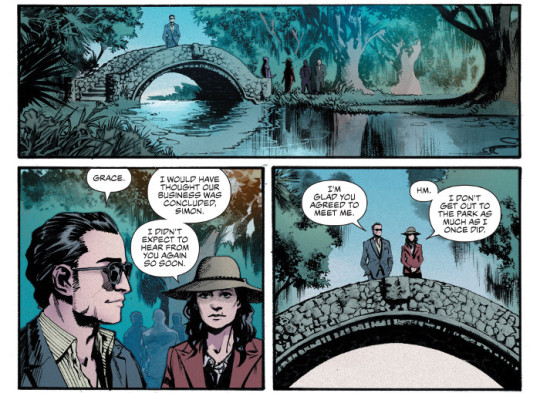

Brothers Dracul #5 circles back around to the beginning of the story, as we reach the end of this interesting retelling and interpretation of the intersection of both the historical and legendary story of Vlad the Impaler, from Cullen Bunn, Mirko Colak, Maria Santaolalla, and Simon Bowland. There’s an interesting twist here that certainly paints Vlad’s action in a different light, and I hope we see it followed up upon in a second series.
| Published by AfterShock

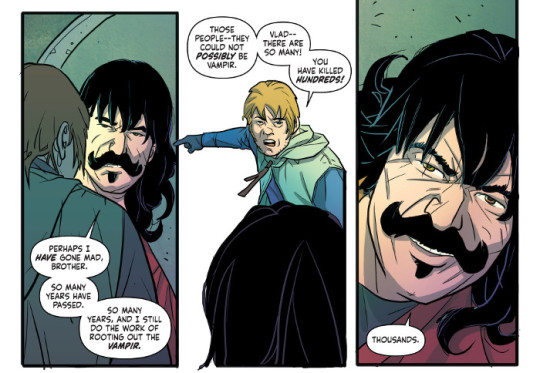

Cyber Force #5 is a nice change of pace as Bryan Hill, Matt Hawkins, Atilio Rojo, and Troy Peteri introduce us to another old familiar face. This incarnation of the team definitely is taking its time to be brought together, but when the storytelling is as entertaining and the artwork is as gorgeous as this, it doesn’t really matter. To note, though, this is not the kind of decompression that feels empty or padded, it’s just fleshing out characters and their lives more than what we’ve seen before.
| Published by Image / Top Cow



Daredevil Annual #1 presents a standalone story of Misty Knight’s days as a detective and her first meeting with Daredevil. It’s good. It feels a bit more like a pilot for a Misty Knight series than necessarily a Daredevil tale, but, as I said, it’s good. The art from Marcio Takara and Marcelo Maiolo is nice. I really like Takara’s style which gives me hints of Phil Hester, Jim Mahfood, and Tomm Coker.
| Published by Marvel

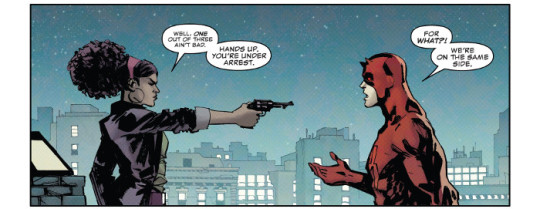

Dungeons & Dragons: Evil at Baldur’s Gate #5 is another fun one, with a focus this issue on Boo. I’ve really enjoyed this series, with Jim Zub giving the party a bit of a breather between larger adventures and giving a great look at them as individual characters. Great art, too, including this issue from Francesco Mortarino and Jordi Escuin.
| Published by IDW

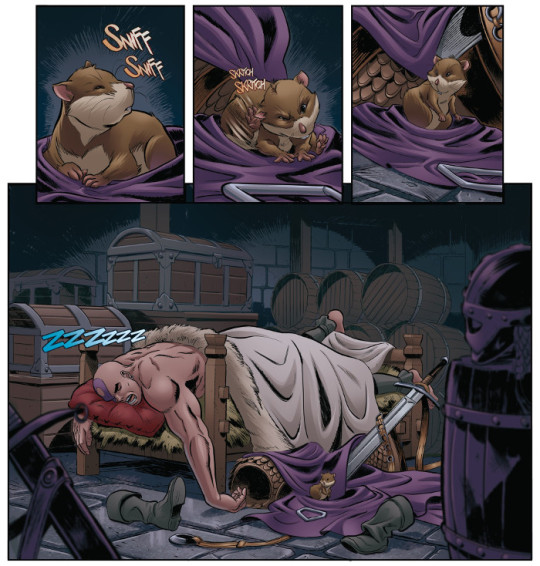

Edge of Spider-Geddon #2 gives us a view into another alternate Spiderverse, circling back around to SP//dr, and giving us a new twist on the power and responsibility rubric and VEN#m. It’s nice to see Lonnie Nadler and Zac Thompson play with more technological horror, with some incredible artwork from Alberto Alburquerque and Tríona Farrell.
| Published by Marvel



Euthanauts #2 is a thing of beauty. Nick Robles and Eva De La Cruz are seriously delivering some of the best art in comics right now with this series. The page layouts, character designs, use of colour, and incorporation of lettering choices from Aditya Bidikar, just elevate the storytelling immensely. Not even to mention how Tini Howard is making the weird science seamless in the dialogue. This is great.
| Published by IDW / Black Crown

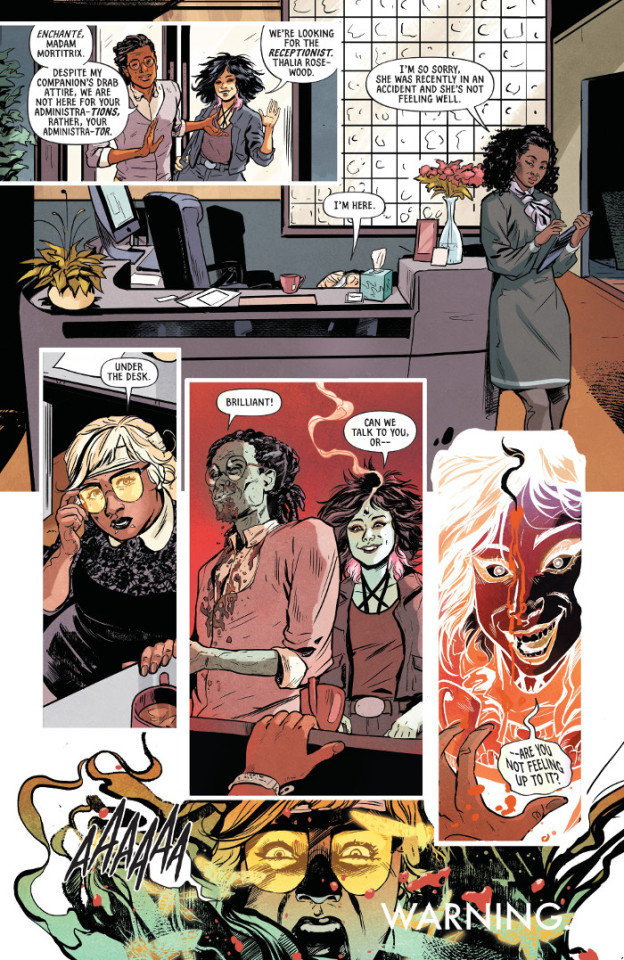

Exiles #7 concludes the Old West-ish arc with cowboy T’Challa. Drop dead gorgeous artwork from guest artist Rod Reis. His depiction of the ultimate villain here shows some nice influence from Bill Sienkiewicz.
| Published by Marvel



Extermination #2 brings the fight to the school, even as the team (and the reader, although it’s not a bad thing) is still confused as to what is really going on. I love this, the tension that Ed Brisson, Pepe Larraz, and Marte Gracia are building is palpable, and the hints of kid!Cable’s actions are chilling. Also, the art is just phenomenal.
| Published by Marvel

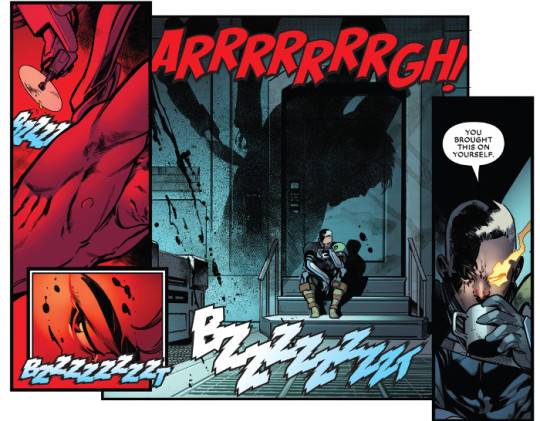

Harbinger Wars 2 #4 is kind of the end to this, but the ramifications and fallout are all supposed to appear in the Aftermath issue. That being said, Matt Kindt, Tomás Giorello, Renato Guedes, Diego Rodriguez, and Dave Sharpe go all out for the spectacle in this final confrontation between Livewire and X-O Manowar. It is still kind of insane how Capshaw could possibly consider what GATE and OMEN have done as being “good”, especially in light of Palmer going absolutely batshit insane, but it does lead to interesting set-up for future conflicts.
| Published by Valiant

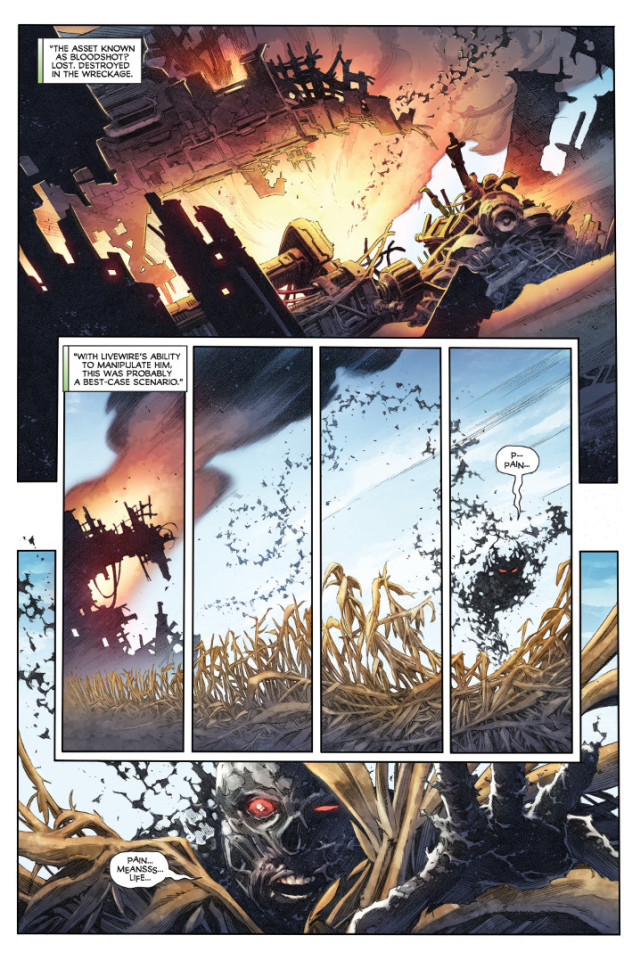

Hillbilly: Red-Eyed Witchery From Beyond #1 begins the next adventure of the black-eyed tramp. I get a bit of a Beowulf vibe from Eric Powell’s set-up and I’m interested to see where it goes. This series sees Powell passing on the artistic duties to Simone Di Meo, Brennan Wagner, and Warren Montgomery and it’s an interesting visual shift from the washes of Powell’s own work in the original series. I quite like Di Meo’s style, which reminds me a bit of James Harren and Troy Nixey.
| Published by Albatross Funnybooks



House Amok #1 is something I’m not sure I can describe. It’s kind of a family drama, but if that family were all collectively sharing a hallucinatory experience or delusion. It’s a very interesting concept that’s only partially revealed by Christopher Sebela, Shawn McManus, Lee Loughridge, and Aditya Baker, but it leads to a very compelling start here. Gorgeous artwork from McManus and Loughridge.
| Published by IDW / Black Crown

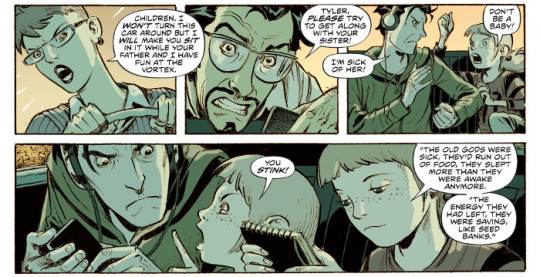

Hunt for Wolverine: Dead Ends #1, like all four of the Hunt for Wolverine mini-series, is kind of a bit of treading water. I cannot say it or any of the previous series are bad, taken on their own separated from this “event”, they’re usually quite good, but as a whole it’s kind of disappointing. It’s a search for Wolverine that kind of comes up empty, acting as a prequel to the return of Wolverine, despite already having returned in Marvel Legacy and hopped across numerous different titles, before apparently being used for evil, as per throwaway bits in the fourth issues of those previously mentioned minis that didn’t necessarily connect with the plots of those minis. It feels a bit scattered and unnecessary, unfortunately, especially when it comes to comparing notes, coming up with the organization we already knew was behind it, and a bit of hand-waving mystery and grandstanding that still tells us a whole lot of nothing. It’s sound and fury. All of which is a bit of a shame because I otherwise generally enjoy the work of Charles Soule and Ramon Rosanas.
| Published by Marvel



Isola #5... Just look at the artwork. Karl Kerschl and Msassyk just keep delivering page after page after page of beauty.
| Published by Image

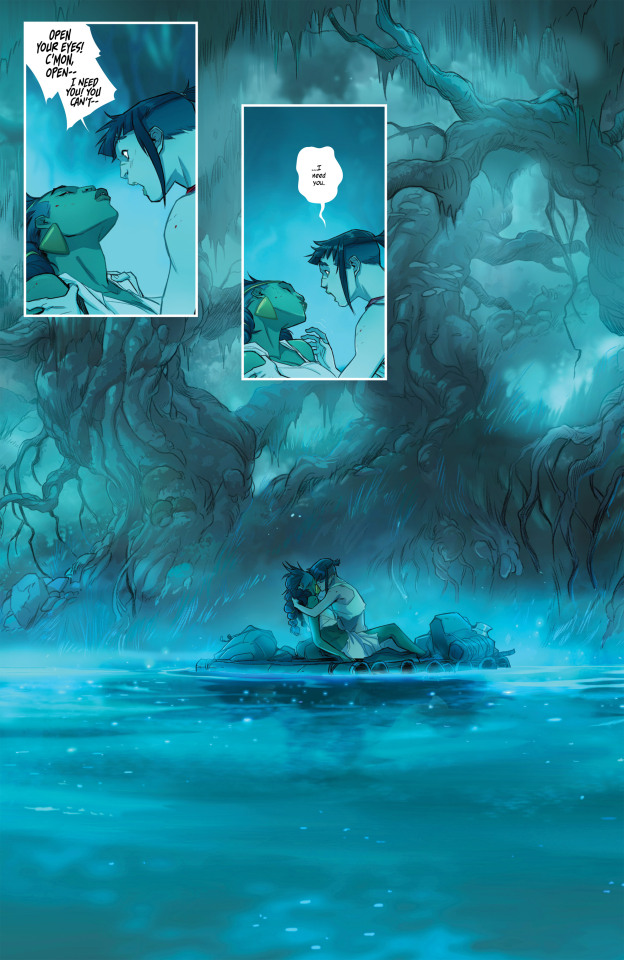

Jessica Jones #2 reaffirms that this is one of the best things that Marvel is currently publishing, with the next two chapters in this story. Kelly Thompson’s dialogue, narration, and banter throughout this issue is spot on, propulsive, and funny as hell when it needs to be, but what elevates it is that this isn’t your typical talking heads approach. The characters are doing stuff, like hunting sea monsters, instead of sitting at a desk or whatever. It’s a refreshing change that overall just makes this all the better. Not to mention Mattia De Iulis’ stunning artwork. It’s slick and polished with a line style that somewhat reminds me of Paul Gulacy and a bit of Rick Mays, and an approach to shadow and colour similar to Frazer Irving. This is a great series that really shouldn’t be missed.
| Published by Marvel



Judge Dredd: Under Siege #4 wraps up this entertaining series from Mark Russell, Max Dunbar, Jose Luis Rio, and Shawn Lee. I really like Dunbar’s take on Dredd and the Russell’s idea of people creating their own law in the absence of law is an interesting philosophical counterpoint to the idea of man naturally sliding towards a state of chaos. Even the mutants striving for society is an interesting challenge to the typical idea of things falling apart.
| Published by IDW



New Mutants: Dead Souls #6 concludes the series with Illyana putting the pieces together for what actually has been going on, it isn’t a pretty picture. This has been a great series from Matthew Rosenberg, Adam Gorham, Michael Garland, and Clayton Cowles and the revelations this issue are heavy. The implications for the X-universe is huge and I want more.
| Published by Marvel

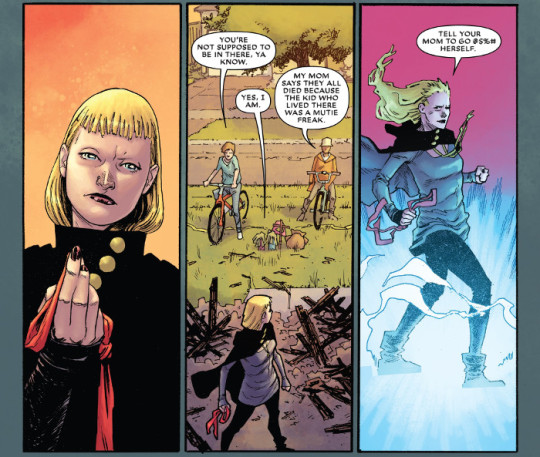

The New World #2 essentially reveals itself as a romance comic, amidst the ultraviolence and social engineering. Didn’t really see that coming, but it’s an interesting move. Trippy art from Tradd Moore, Heather Moore, and Ludwig Olimba.
| Published by Image



Paradise Court #2 continues to be an entertaining horror comic from Joe Brusha, Babisu Kourtis, Leonardo Paciarotti, and Taylor Esposito. This gives us the part of the story where our protagonist is experiencing the horror and everyone else is telling her she’s just imagining it, but it’s still well told and well illustrated.
| Published by Zenescope

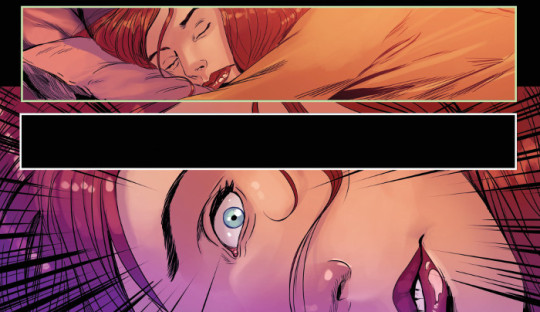

Rick and Morty vs. Dungeons & Dragons #1 is about as perfect a crossover of two properties as you can get. Morty trying to get into D&D because he thinks it will get him laid is the perfect in to the world of the game and the cartoon, perfectly blending the two for fans of both without alienating or diminishing either. Jim Zub, Patrick Rothfuss, Troy Little, Leonardo Ito, and Robbie Robbins are faithful to both and in doing so deliver a wonderful beginning to this story, that also educates along the way.
| Published by IDW & Oni Press

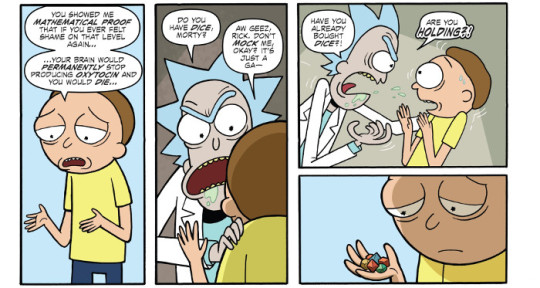

Runaways #12 is easily one of the best issues in what has already been an exemplary series. Rainbow Rowell, Kris Anka, Matthew Wilson, and Joe Carmagna focus here on forgiveness, acceptance, and second chances, with some truly beautiful character work between Gert & Victor and Nico & Karolina. If you don’t have a giant grin on your face by the end of the issue, I question your humanity.
| Published by Marvel



Submerged #2 is still weird, very weird, but there’s some really good bits in here demonstrating some of the emotional manipulation that family members sometimes employ. Beautiful, ethereal artwork from Lisa Sterle and Stelladia.
| Published by Vault

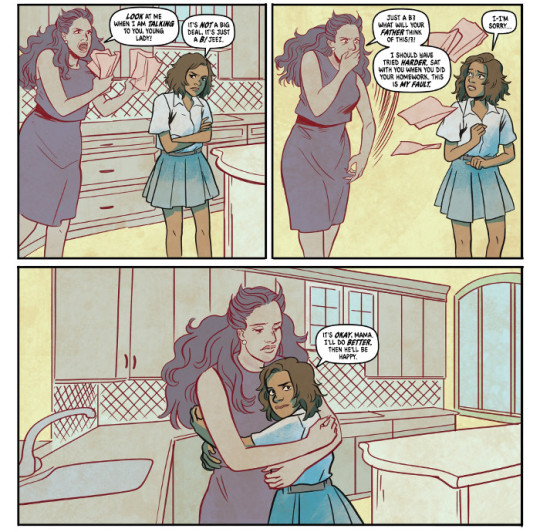

Venom: First Host #1 is somewhat strange to see in light of where Donny Cates and Ryan Stegman have taken the character, but this limited series from Mike Costa, Mark Bagley, Andrew Hennessy, Dono Sánchez-Almara, and Clayton Cowles serves as both an interesting addendum to the symbiote’s history and as a continuation (and likely capstone) to the previous creative team’s run. It’s pretty decent.
| Published by Marvel

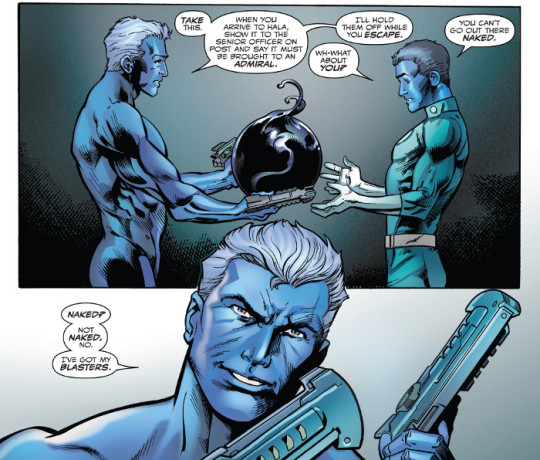

Web of Venom: Ve’Nam #1 is a one shot fleshing out the backstory of Rex Strickland and the SHIELD experiment that bonded the early symbiotes to soldiers set loose during the Vietnam War. It’s an entertaining tale with some nice guest stars and sweet art by Donny Cates, Juanan Ramírez, Felipe Sobreiro, and Clayton Cowles. I particularly like the scratchy, faded look in the art to make it look a bit “old”.
| Published by Marvel

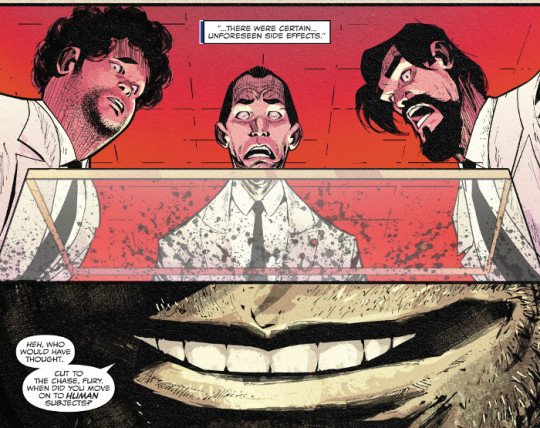

X-23 #3 is great. Mariko Tamaki has nailed the characters and the art from Juann Cabal and Nolan Woodard is incredible. The page designs alone elevate the storytelling immensely.
| Published by Marvel

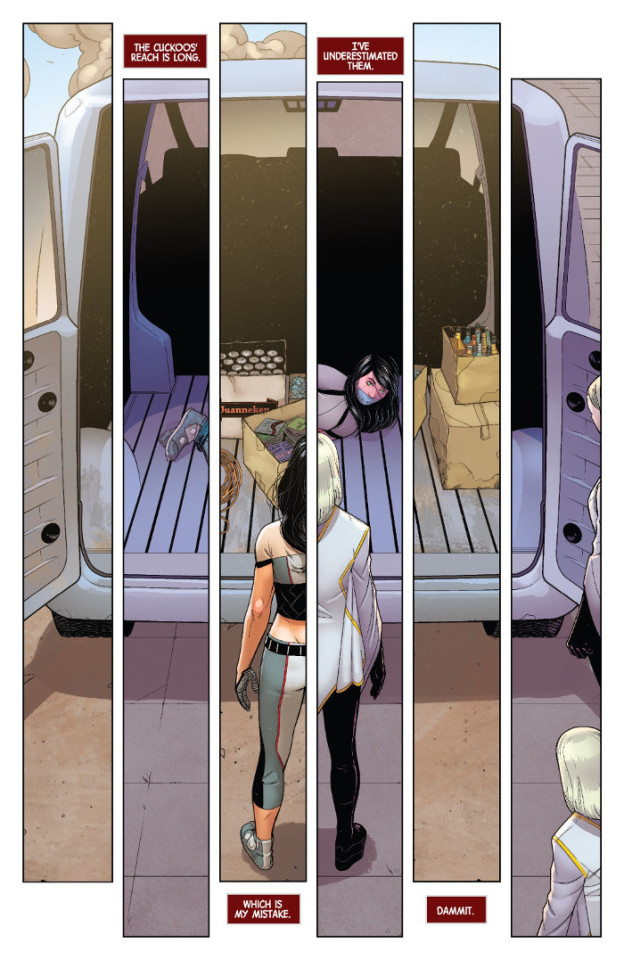

The X-Files: Case Files - Hoot Goes There? #2 concludes the second of this new approach of a series of mini-series and it’s...weird? Funny, but weird. Definitely taking a page out of some of the more outlandish episodes of the series, where you question whether or not what you saw happened actually happened. Still, it’s entertaining, which is all that really matters. Fun from Joe and Keith Lansdale, Silvia Califano, Valentina Pinto, and Shawn Lee.
| Published by IDW



X-Men Blue #34 looks like it largely serves as a capstone to Cullen Bunn’s work with Magneto over the past four years or so, as he winds down his run here and continues to tidy the characters up a bit before he’s done and hands the reins off to the next band of storytellers. It feels like there’s a lot more here that he would have like to have told, but what we get here is still excellent. The hints at the next stage for Magneto and mutantkind are intriguing. Great art from Marcus To and Matt Milla.
| Published by Marvel

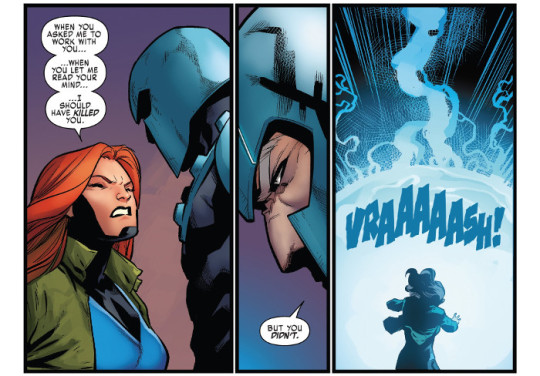

X-O Manowar #18 gives an interesting transition from this flashback of Aric’s pre-Shanhara life to his return to Earth, focusing on how ideas, people, and culture keeps changing. Matt Kindt delivers a pretty chilling reaction to it. All with some nice artwork from Trevor Hairsine, Brian Thies, and Diego Rodriguez.
| Published by Valiant

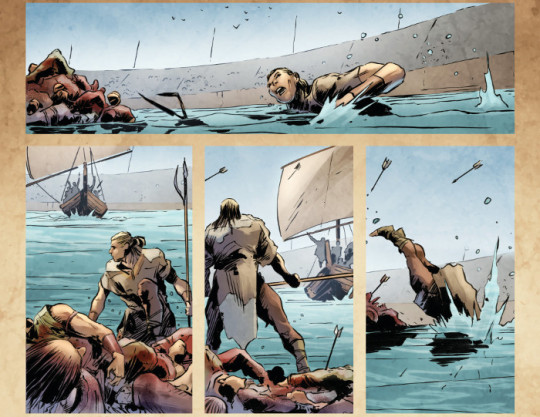

Other Highlights: Deadpool: Assassin #6, GI Joe: A Real American Hero #255, KINO #9, Marvel Two-in-One #9, Mighty Morphin Power Rangers: Shattered Grid #1, Modern Fantasy #3, Moon Knight #198, Ms. Marvel #33, Red Sonja #20, Rick & Morty #41, StarCraft: Scavengers #2, Star Wars: Lando - Double or Nothing #4, Star Wars: Poe Dameron Annual #2, Star Wars Adventures #13, TMNT: Bebop & Rocksteady Hit the Road #5, Wayward #28, X-Men: Grand Design - Second Genesis #2
Recommended Collections: 2021 - Volume 1, 30 Days of Night, Big Trouble in Little China: Old Man Jack - Volume 1, Black Cloud - Volume 2: No Return, DuckTales Classics - Volume 1, Eugenic, Factory, Femme Magnifique, I Hate Fairyland - Volume 4, James Bond: Hammerhead, Judas, Killer Instinct, Stray Bullets: Sunshine & Roses - Volume 2

d. emerson eddy is not the very model of a modern major general. Nor a scientist salarian for that matter.
9 notes
·
View notes
Text
Poem Compilation
Compilation’s Name: Revival
Dated: December 2017
Contents:
1. knots 2. wishing well 3. alien girl 4. Constance 5. Ophelia 6. homemade constellation 7. Moonsetter 8. a reminder and a gentle plea
(All poems are my creation and belong to me. If you want to share them, please reblog or link the tumblr post.)
Poems below read more
1. knots
at some point i felt like i knew who i was but right now, all i really know is how i look, how others see me
if mirrors could speak, i would’ve asked them already if the clocks could hear me i would’ve asked them too
at some point i felt like i knew how time rolled by but right now, all i really know is how everything dies, how everything lives
the knot i would see as i grew up untangling it, it takes forever but it’s something i do, something i remember
whether it was a knot in my earphone wires a knot in the strings of fate i had with others, a knot in the ropes binding the sail to the mast or a knot of a ribbon on top of a gift
i thought it was only a knot (but to be honest it was much more than a knot)
it was just a knot, i would think (but no, it was not simply just a knot) (no, no, no, no)
it brought me together with so many people, and later, it would drive me crazy and irritate me, if mirrors could speak, if the clocks could hear me, i would ask them if reality and time was made of just a bunch of knots.
everything, people, events, they always bunched up together and someone always ends up having to unknot all of it. at this point, i guessed my life, who i was, what i would be as i grew older
it would all be made up of knots. that’s right, it would just be made up of knots.
(but that just means someone will come by and unknot me too)
2. wishing well
in the middle of the day, she wished, throwing down her pretty dimes down the wishing well
she wished a wish
in the middle of the night, they heard, the sounds of the dimes hitting the bottom of that wishing well
they heard that wish
whether it was a blessing or a curse
the girl did not know those who heard, they decided.
it would be a curse one that burned slowly, leaving ugly marks on her skin, she would come to regret it for ugly things were always meant to be pulled apart.
if one fruit went bad, it would be smart to remove it. if there was a knot in your web, you’d cut it off, too. if someone was sick, you wouldn’t let others stay near them. the smog in the air? it hurts to breathe it, so disperse it.
for ugly things were always meant to be pulled apart.
but the thing is, she didn’t know it was ugly then. in fact, it’s not so ugly now.
so underneath the cotton candy sky was an unsavory drama playing out, slowly, burning her.
in the middle of the universe people knew, she wished, she let go of her pretty dimes, her eyes closed, down they went, down the wishing well.
she wished a wish, and they heard that wish.
in the middle of the time people knew, they heard her, her dimes at the bottom only an echo of an earnest, good-willed wish.
that wish, whether it was a blessing or a curse. the girl still doesn’t know, and those who decided don’t know anymore either.
3. alien girl
alien girl, alien girl i wonder, upon the north star, if you would visit me again this century?
we met when i could see saturn in the old telescope my granddad bought me, the color of your eyes glowed like neptune, and you told me my eyes were the color of charon,
and you said though charon was small, you could see me, my eyes, because it was so dark. and so you said, you fell in love with me, and wanted to know my history, how i came to be.
you told me how in the void-filled universe i was this sparkling object that caught your eye and inspired you to keep living, despite how empty all it was. you told me, over and over, you loved me
and you’d do anything to be in the same planet as me. yes, you told me all those things, from your favorite food, to heartfelt promises, to all the things that shook your core and broke you
you told me all of those things. especially your promise to come to me. to rise and meet me at some other star besides ours someday, sometime, in the future.
alien girl, alien girl, i wonder, upon the north star, if you really did mean all those things you said.
we were so far apart, when we met. did you realize that? we were so many light-years apart when we met. we were so many light-years apart when we parted.
i loved you, i really did. but did you really love me? did you really love me so much that you could have moved yourself from where you were
to a star that burned brighter? a planet that was better, a point closer to me, that you could have worked on your own path
so you could be closer to me?
was i just some pretty thing to look at for you? something you could take and devour whenever you felt bad and needed to look away from how apathetic the universe was to everything?
i was your muse, as you were mine, but all the art you created crumbled when i left. alien girl, alien girl, you made me the muse of debasing, fleeting art.
maybe because we come from different worlds, that you thought it was okay to love me like that. as for me, i don’t want to be loved like that. no, i never want to be loved like that, again.
alien girl, alien girl, i want to tell you, i cannot be your savior if you cannot even save yourself.
4. Constance
the rushing river did not let up before my eyes, but instead of water it was strings of letters with words i understood by themselves, put together in ways which made me lost.
but standing within the swift currents, a word stood out to me, shining, glowing, softly calling out to me, it was Constance. the word was Constance.
her name, that woman, was Constance.
abducted, in danger, she trembled later, loved and admired by the protagonist with a name i still cannot pronounce. she was beauty, her voice and face so angelic when she spoke to him, the musketeer, when her words, splashing, brushed against my hands, when she lay, quietly dying, uttering small things (i don’t even remember her last words but surely the musketeer will)
her name, that woman, was Constance.
a soft echo amidst the noisy squall the chaos, in its full grotesque form, reaching out, greedily, of the pages to grab me. she was a glowing light above the dark river the scenes of history described so vividly at the discretion of a writer who possessed unbridled, romanticized imagination.
her name, that woman, was Constance.
how i loved her then, how i love her still, i wish to be like her, that woman, Constance.
5. Ophelia
there are way too many stories of ophelia’s in this world, the ones, made from purest crystals, being thrown, thoughtlessly, into the riptides this ophelia, this ophelia, harsh hands grab her and tear her apart, piece by piece
or half by half, whatever it feels like at that moment. she shatters, over and over again, and i can only watch as i break apart myself.
romantics would say, thoughtlessly, she’d find her hamlet, her dearest hamlet, but no, this is not the happy ending i want for her. no, this is not the happy ending she wants, even if her singing heart tells her otherwise, that heart, it’s only heard the melodies sung before
the melodies that sing of her sweet, insane death at the hands of those who should’ve loved her but instead accused her, without a second thought, of being the most impure thing because she didn’t bend to his will.
in the past, she died, at such cruel hands. for this was the only song that had been sung for her. yes, that was the only way she was allowed to live, for her to die a cruel, insane, reasonless death.
this tragedy best blooms under the guise of those whose perverse minds find fantastic release in making up some fake universal fact that justified how cruel people were to her, to that ophelia, to this ophelia, to all the ophelias, to the ophelia within me, to the ophelia within the daughter of past ophelias.
the world, it does not know anything better because it can’t know anything better, it is rough at the edges which cut and pierce all skin pricking our souls, testing them, twisting them into unsightly shapes.
but the people, they can know that there are better things, they do not have to be like the riptides, for they can offer their souls as pearly shores to offer respite, to soothe, to heal.
no, all the ophelias in this world do not need their dearest hamlet, especially the one that will break them.
i hope that by their cracked light their fragmented beams, people shall realize that the world does not have to be like this.
6. homemade constellation
chipped knuckles, bleeding fingers, they picked a shard up, from the ground, without looking twice, they cut through the air
blood was spilled. the air parted, as their lips parted, quiet pleas escaped. “save me” is what they would say.
unforgiving night held a vicious grip on their throat, their arms, trembling, flailed everywhere, without thinking twice, they beat the air
blood was spilled, it was probably theirs. but, the air parted to make room for them. as they opened their lips, a cut placed above them, “save me” is what they would say.
all this time, seeing so little, feeling so little their body only dancing to the monstrous sways of nauseous fear, of unknown, deep fear, they saved themselves, their bleeding a silent testimony.
“save me” but those were hard words to say out loud.
they whispered those words “save me” to themselves as they stared at the constellations.
“save me” they echoed as they cut through the darkness to put together
their very own constellation, a homemade constellation.
7. Moonsetter
make me believe, that i am like the bright, big sun on the horizon, i will rise again after the next few hours, on the fabric of space, i give off light, and people see me, nested within the embrace of the universe we can see. so that i never disappear without a trace, hold onto me ever so tightly that i won’t forget to never let go. the night approaches, but with your words, i remember that like the bright, big sun, i will rise again as time expires. eternally, i hope that i can remember your encouraging words. rooted in them, i will move forward and shine.
8. a reminder and a gentle plea
look,
the field of flowers in your view whenever you sighed, contently, his name, the grass which brushed your knuckles as you dipped your hand in, daydreaming it’s not there anymore. all of them have wilted away, shrinking away from your eyes full of tears the ones spilling over as you try to make sense of what had happened.
look,
the home that you built when you were alone left to the mercy of the piercing monitor light at hours, silent and dark, that you had to fill, the world in which its people called you the hero, their frantic whispers becoming a chant, tying you to fate, the world which was in trouble it’s not there anymore. the churning stories have faded away, their sounds growing ever fainter as the years rolled by your ears have grown accustomed to newer melodies harmonies coming from elsewhere, as you trudge ever forward.
look, all of those things, none of them are here anymore. yet their dancing shadows flicker in your eyes, looking upwards, the echoes of their motifs chime softly in your ears, hearing still, with a burdened heart, have you carried yourself ever forward still, even shouldering the weight of stories which you cannot remember but still, you know that you have heard them and understood them, you have empathized with them, even if they have dissolved into the rest of life. with a soft grip on your soul, they bound you to some astral fate one which outruns your desperate grasps as you try to grab the truth, you have started a quest to learn, to listen, and to understand. you are still on such a quest to learn, to listen, to understand.
look, the world continues to turn, and with it, you turn still too even if you have forgotten the words which bestowed wisdom upon you your growth is undeniable. you cannot see it, and I cannot see it either but with no doubt, you have grown.
the ghosts of flowers past are embroidered in your soul, their whispers, their pleas, their lessons, all stain your color, you, along with the rest of the world, have forgotten their visages, but with such an impression it is undeniable that they once existed
just like you are existing, at this moment. at this time.
please, for your sake, first and foremost, remember yourself, at least.
1 note
·
View note
Text
Prvi maj
I’m not sure if there’s an exact moment American society became largely soft, or when/if popular perception became that it was. Maybe the cows got too fat in the absence of lean times. Rich white Americans have always sent those of other colors and socioeconomic classes to fight their wars and keep their peace. All while trying to convince those of us who had to stay behind that those who were doing the fighting were protecting our freedom to keep up with the Kardashians – from the same couches where we watched them struggle to preserve the American ideals of life, liberty, and the pursuit of happiness —ideals we were taught to revere almost from the time we could walk. For some reason, whenever these thoughts dance in my head, I think of Maggot Brain by Funkadelic:
Mother Earth is pregnant for the third time For y'all have knocked her up I have tasted the maggots in the mind of the universe I was not offended For I knew I had to rise above it all Or drown in my own shit
I’m not suggesting that my generation and the one after it aren't acquainted with suffering, merely that for too many and for too long, these American lives have been too comfortable and hollow for our own good. A strong leader won’t save us, our children, or the children yet unborn. We’ve got to save ourselves. No one can (or should) do it for us. The best reminder I’ve ever gotten of this came on a train ride thousands of miles from home, as I sweat armpit-to-armpit with hundreds of single-serving friends on my way to see a family who lived on a street named after the guy who supposedly discovered of all places, America. The first of May in many parts of Eastern Europe is observed like Labor Day in America. Trains overflow with university students bringing themselves and their laundry home from the big city to the slowly dying villages and towns that speckle the countryside, home to their families and stories of those who’ve left in search of a better life in America, Canada, Australia… Anywhere really. Trains are easily the cheapest and slowest (unless your name is Josip Broz Tito) method of transportation throughout what was once Yugoslavia. Still, I can only speak for the Serbian ones because they alone have come into contact with my senses of sight, smell, touch, taste, and hearing. It was nothing for a train to stop for forty minutes with no explanation from the conductor or engineer. Many of the tracks probably hadn’t been worked on since Tito rode on them in the blue train that carried him around the country after his death on May 4, 1980, his final act as president of the League of Communists of Yugoslavia. Even today, nearly four decades later, I’ m almost positive that if you ask someone of the right age, they’d tell you May 4th should be a national day of mourning.
I sometimes wonder if the Partizan generation that rose after World War II in Yugoslavia is much like what Tom Brokaw has called the Greatest Generation, its American counterpart. For my money, their biggest similarity between them is that both came to prominence through a set of historical circumstances that could not repeat themselves. I think both generations knew it, too. And those of us who came after them secretly hated them for it, at least a little bit.
The task of crafting your future is daunting no matter when or where you are, but it’s easier when the other side is in ruins. There’s a reason history is more often than not a victor’s story: There are more of them left to tell it, and if you hear it often enough you start to believe it. Soon, if you’ve drunk enough of the Kool-Aid, you don’t even question it. Just like an inexplicable pregnant pause aboard a Serbian train. It’ s just the way it is. If you’re lucky, in nine months, you’ll reach the end of the line.
If a pregnant pause happened on an American plane, train, or automobile, there would be hell to pay. So many people have grown so accustomed to order and precision that even the slightest inconvenience could be blown way out of proportion if it happened to the wrong person at the wrong time. In Serbia, I imagine they feel the pain no less, but most would greet it with a shrug of the shoulders. This is why none of my single-serving friends on the train to Subotica that day were particularly bothered by having to stand armpit-to-armpit until someone freed themselves from the mass of humanity when the appropriate station finally appeared on the horizon. No one raised their voice in protest of the off-key signing or free-flowing alcohol. I think I was the only one who wanted to punch the guy strumming along with his girlfriend’s Mp3 player on his guitar in the face. Hell, he probably went to elementary school with half the people in our compartment.
I don’t miss Serbian trains one bit. The relative order and comfort of American public transportation are nice, but there’s only so much a man can take. I’m not suggesting that we need another Normandy or Vietnam to thin out the ranks of the American weak, or that we give them no choice but to forge themselves in battle, as the youth of Yugoslavia had done during the lost decade of the 1990s as their country and civil religion of brotherhood and unity disintegrated. I just think we could learn from a bit of chaos. We’re all tougher than we think, no matter how much we try to ignore, forget, or numb that fact.
When the train finally made it to Subotica, my fiancée (at the time) and I took a cab from the station to her family home on the street named after the guy who supposedly discovered America. As I write this story today, I wonder if the street has been renamed Indigenous Peoples’ Street – that’s not a knock on them, more of a curiosity – but I quickly remember that in Serbia, it’s far more likely a street will be named after a long-dead Russian poet in a nod to shared Slavic origins, or a long-time janitor in the Ministry of Foreign Affairs, in a nod to sacrificing the best years of your life for the good of the idea of your country. I can’t really blame them for being nostalgic about their past and unsure of their present. Each person and nation carries some of each with them no matter where they are. Resistance to change is only natural. Why should they have to give up their 330 ml beers and learn to have lunch at noon? Polse Tita,Tito (After Tito, Tito) still resounds with those of a certain age.
As an undergrad, almost every time I told someone that my major was Slavic and East European Studies, their immediate follow-up question was, “Why?” Occasionally, I’d get the classic: “What do you want to do with that?” In my early twenties, the best answers I could often come up with was that I knew I wanted to go to Ohio State, I enjoyed studying languages, or the prom-date-on-the-porch story. By my mid-twenties, the stories had morphed into a dream of working for one of the alphabet agencies of the U.S. government. “I knew I needed in-country experience…” We are nothing if not the stories (and lies) we tell ourselves.
Today, I don’t have as many opportunities to speak Serbian, eat burek, or devour ćevapi as I used to. The alcohol doesn’t flow nearly as freely as I walk by the beer and wine drive-thru on my way to work. Usually, I don’t encounter forty-minute delays on sidewalks laid when Gerald Ford roamed the halls of the White House – the part of town I live in is too new for that – but I must confess that when I find myself surrounded by a bunch of the soon-to-be state flowers of Ohio, constructicus symbolicus (the Orange Barrel), I wonder if, one day when I leave for work, the sidewalk I walk on will be completely gone. It already ends at a random spot just beyond my apartment complex – a very Serbian approach to construction – which reminds me of the construction boom I witnessed in Novi Sad from 2008-2011. I wonder how many of the projects for building so many of those apartment buildings just randomly stopped, like my sidewalk, even though the buildings were unfinished and people had already bought apartments in them that would never be completed.
Sometimes, I think about how I don’t use my degree in the sense that I don’t have a job in my field, and I wonder how my life would be different if I did. If I start to feel sad about it, I try to remember that I’m either tired, hungry or under the influence. If I address whichever of those three it is, I’ll usually be okay until the next wave hits. I don’t have time to feel sorry for myself or regret the choices I’ve made, and I remember how many people I met in pieces of the country Tito once ruled who would kill to have the opportunities that I have. I’m not special; I’m just trying to make the best of what I have instead of worrying about what don’t, which is easier said than done at times, but it’s the only philosophy I’ve found by which you might not drive yourself insane with envy or mad with regret. The people of the former Yugoslavia taught me lessons of survival and resilience. While their country reinvented itself over and over in the history books, they just kept on keeping on, amidst the bombs, the bullets, and the booze. As their world collapsed, they held onto whatever they could, and each other.
If that ever happens to me, or those I love outside of Serbia I know I can handle it, along with just about anything else life throws at me, thanks to a ride I once took on a train. I was not offended. For I knew I had to rise above it all, or drown in my own shit.
0 notes
Photo
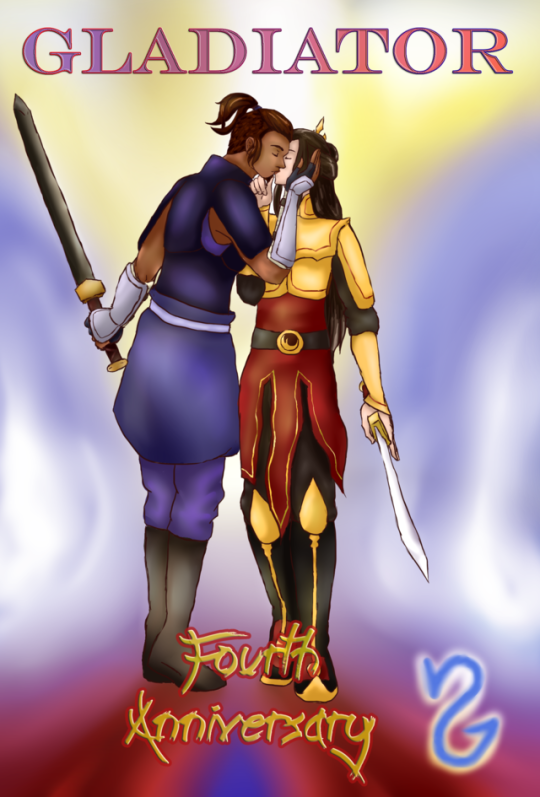
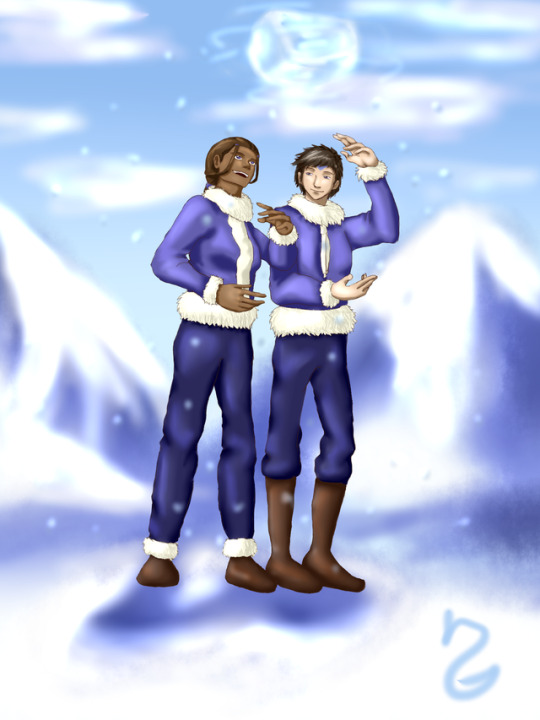
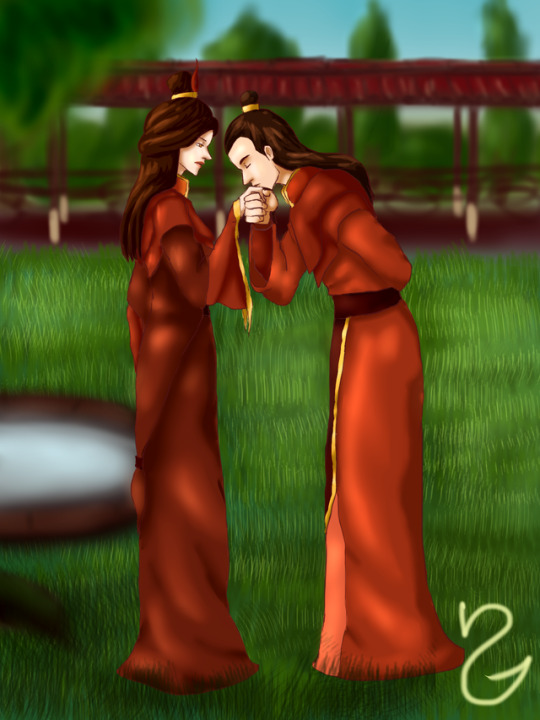
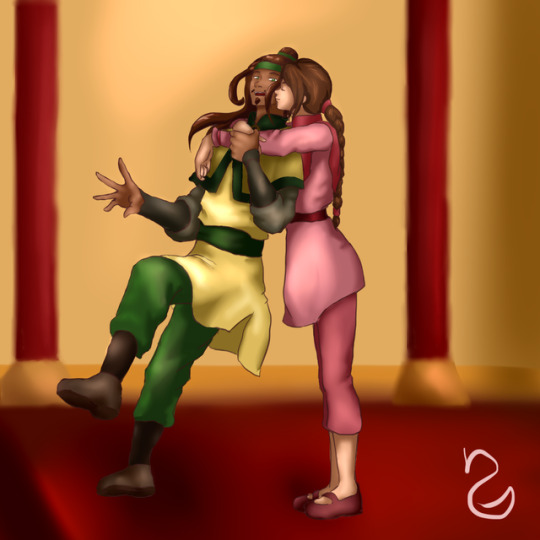
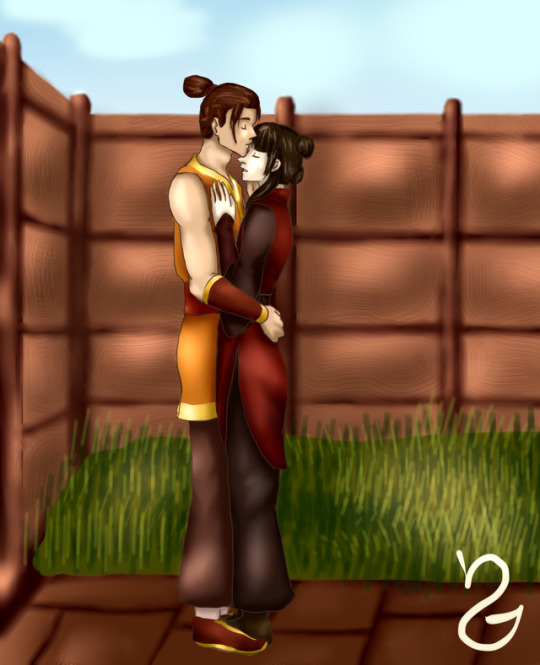
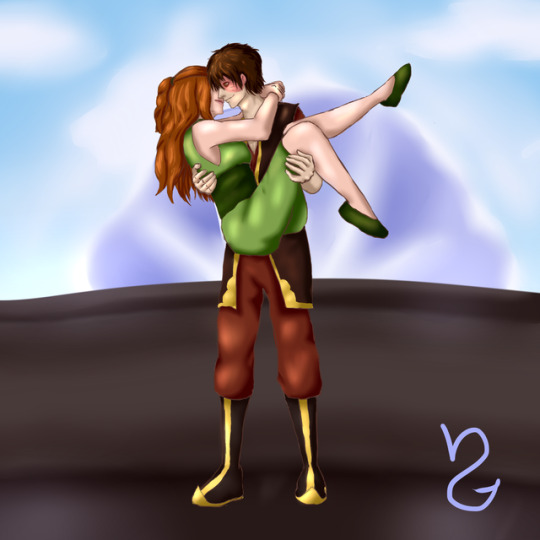
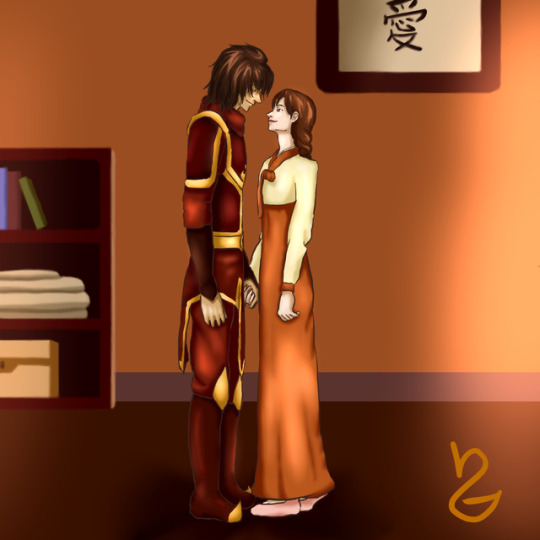
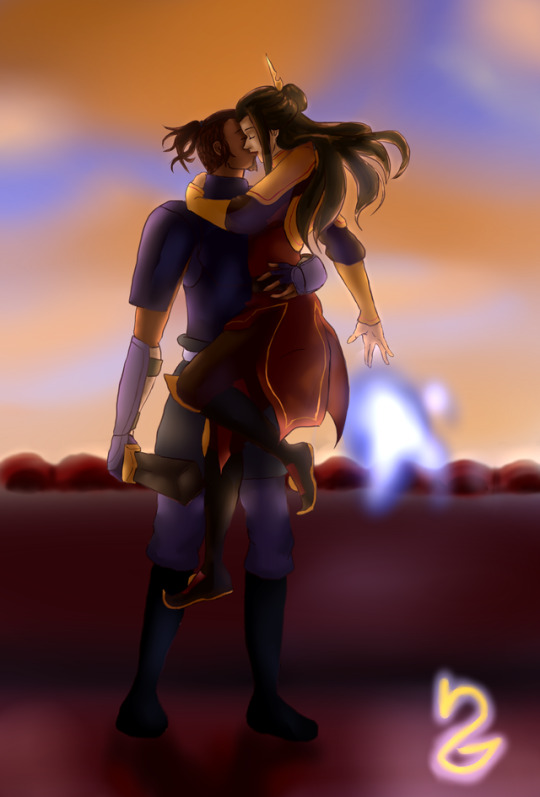
And here we are! Another March 26th, another of Gladiator’s anniversaries has come. What a Fourth Anniversary it has been, eh? Thanks to every last one of you for your support through these years, and through this week too as I posted the collection of fanarts seen above!
Under the cut, one of my long-winded ramblings, this time about the story that has changed my life beyond belief.
Admittedly, this hasn’t been an easy year. Personally, I’ve had some struggles with my surroundings, with school lately, with circumstances that often overwhelm me.
Not everything goes right, in fact, most things won’t unless you actively work to make it so, and even then there’s a chance things might fail, too. Nothing is as frustrating as putting your life and soul into something, and being told that it’s not good enough. It’s happened a lot to me, more often as time goes by, actually.
Amidst this chaos, with these struggles of so many different natures, there’s one place I can run to where I can forget everything that plagues me. Where I can give myself away completely, invest all my energies into it, and regardless of what people may think later on, I will still feel that every effort was worth it. And that one place, that one haven I have left, is undoubtedly Gladiator.
From the start, I’ve written and posted fics because I hoped, somehow, that they might reach people who would enjoy them. I haven’t said it a lot, but in the middle of writing Origins of Pro-Bending I had a brief crisis in regards of fanfiction, where I ended up asking myself why was I doing it at all? Did anyone really want to read this? Why would they, when there were likely so many other better fics and writers out there?
I told myself to finish that story, though, not because of desperate hopes that someone out there would read it one day and validate it by saying “Oh, this is the best story EVER!”, but for a very much simpler reason: I wanted to finish it. I wanted to see the final product. I wanted it to exist, if just so that I could go back to it one day in the future and enjoy it fully all over again. Maybe nobody else would read it, but as long as it mattered to me, it meant it mattered to someone. That view counter could stay in 0, but the story would have been told. And that was what I needed the most.
The same mentality is what guides me with Gladiator: I knew it would be the largest project I’d undertaken in my entire life (and indeed it is), I knew it would take me FOREVER to finish it (and indeed, four years have gone by, but this story is still not done, clearly!). I was warned by so many people about the possible negative consequences of writing it: you get used to the initial hype, but the people who’re supporting you now won’t support you forever. Some might be gone tomorrow, others in two years, others in ten. You won’t be in the limelight forever, and if you lose courage because of that, you’ll lack the strength to finish this huge-ass story that you’ve put so much work into and everything will have been for nothing.
So with all the potential problems, with all the possible drawbacks (I probably could have been a way better student in school if I hadn’t taken up such a time-consuming project, yes...), I still told every last one of them that I wanted to do it. That I would keep doing it, no matter what.
Yes, there’s been hard times, and yes, there have been moments where I’ve doubted myself as a writer, as a human being even, as ANYTHING, because of the responses my stories can get. Yes, I’ve struggled with motivation a few times when people who used to love this story passionately now seem mostly disinterested in it, and I can’t help but wonder where did I go wrong. I’ve learned sometimes you don’t go wrong at all, that people just move on... but maybe I did go wrong somehow, too. Maybe I did.
But even then, I can’t let go of this. I cannot stop writing this story, and I won’t stop until I reach the final scene. It’s the first story that has made me laugh so much, the first story that brought me to serious tears while writing it, the story that seems to bring together absolutely everything I’ve learned through life, where everything I am is reflected. Maybe this story isn’t half as big a deal as I make it to be, but for me it’s more than just a story. For me it’s more than just the longest Avatar fanfic on FF.net, it’s more than just a ship manifiesto, it’s more than a hobby I dedicate myself to when I have some time off.
I’ve been asked how I do it. How do I have so much motivation, how can I write such a long story and not stop, not get tired, not get bored? There’s a ton of answers I can give to this question (one of them being, of course, that my passion for the two characters who drive my story is responsible for all that motivation). But the truth is, I live in a place where I am used to seeing misery, pain, horrors every day. I see a city decaying around me day by day, a country in collapse, with next to no hopes for something to break its fall. Things aren’t easy here, and worse obstacles pop up every day, too. I’d rather not go in depth about the Venezuelan crisis, but all the same...
What keeps me sane, in this insanity, is Gladiator. Reality can outdo fiction in many ways, but my reality falls short in many regards, and I’m powerless to change it. But whenever those overwhelming waves of depression start climbing up, trying to drown me, I find myself afloat again because I still have to write so much more! I have so many stories plotted, so many story arcs, so much content that I can’t wait to produce. Because Azula still needs to become the greatest of all Fire Nation leaders, because Sokka still needs to end the war and make sure his people stay safe and sound. Because Zuko has to find what life means for him, because Suki has finally found happiness after all the sorrows she has seen, because Rui Shi needs to tell Song how he feels, because Ozai and Ursa’s past need to be revealed. Because all these characters need to bring back balance to the world that lost it, and they will only do it if I write it. This story won’t tell itself, and I don’t mind it: I want to tell it. I want to explore every last bit of it, and every new Word doc I open to write more chapters is a blank page I can’t wait to start filling.
I’m not the greatest writer ever, regardless of the people who may say so, regardless of how many readers may think highly of my skills. I could be better, no doubt, and that’s why I keep going back to the story, to fix all that can be fixed, to make it the best it can be. The best I can make it as I am. I will continue to grow as a writer, or at least, I’ll try to. I will grow as an artist too, hopefully, and continue to accompany the fic with as many of my drawings as I can.
It may sound insane, it probably is. But regardless if that’s not the case for anyone else, this story is more than a story for me: this story is my release, my opportunity to dream, to imagine, to believe, to feel so many things that I’ve been numbed to in my daily life. Gladiator sets me free. Gladiator is a part of me, and I’m sure it will continue to be for the rest of my life. I love this story more than words can say. And as it was when it came to Origins of Pro-Bending, writing Gladiator already is its own reward. Any and every companion who comes along for the ride is a great friend to have by my side in this quest: Whether they stay or they go, I’m glad they were here for however long they were.
Thank you, to everyone who has been here, everyone who still stays by my side, everyone who may come in the future. This story exists because a stubborn, reckless girl decided one day that she wanted to dedicate herself to something a thousand times larger than she was. Something that, she hoped, would be cherished by those who might be compelled by the story of a Princess and a Gladiator falling in love, who will do everything in their power to right the wrongs of the world they live in.
There’s still a long road ahead, and a challenging one at that. My life may be very different by the next of the story’s anniversaries, but I’m sure that I will still be here, and that I will continue to tell this story. And I will be grateful forever that I get to be the unbelievably fortunate writer with the privilege of bringing this story together. The sum of my life’s decisions have brought me to this day, and I find myself filled with gratitude, relief, peace. I know I chose the right course, and I will continue to tread it as I go. I will carry on writing this story, for however long as it may take me to finish it, and I will continue to be grateful to no end for that one PM that started it all, that gave me the incomparable opportunity of becoming the writer of Gladiator.
#gladiator#sokkla#sokka#azula#kataang#katara#aang#urzai#ursa#ozai#tyru#ty lee#haru#mai x ruon jian#mai#ruon jian#zuki#zuko#suki#song shi#rui shi#song#I kinda needed to ramble there#I think not everyone understands why I'm still doing this#so maybe if you're wondering#reading that long-ass read more will clarify a few things
170 notes
·
View notes
Note
every 5th question :O
5. since how long do you write?
well i mean ive been writing since i was old enough to write tbh. like i think the first story i wrote was in like 5th grade when me and my friends had to make a children’s picture book for an assignment and i LOVED IT. in 6th and 7th grade i had a couple creative writing assignments that i super enjoyed so by 8th grade i was writing original stories of my own. most of them were literal self inserts of just me and my friends going on adventures and stuff. it wasnt until 10th grade that i started writing fanfiction for Twilight and then slowly got into fandom for the first time. so yeah, that was a long answer but basically for about 10 years ive been writing so far! and now its my major in undergrad!
10. how do you do your researches?
EXTENSIVE GOOGLING tbh. and lots of youtube videos bc im a visual learner! but if its something for an original story/college assignment i can be persuaded to go to the library and check out a book for research
15. hardest verse to write
as a prose writer i dont deal with verses a lot since i dont write music/poetry
20. favorite character to write
tbh probably may from pokemon, oddly enough. she’s so goofy and fun and light hearted and writing her is always really enjoyable
25. favorite line you’ve ever written
(its 4 sentences but w/e. i love this story)
Later on in life, very very later, perhaps when he was old and grey, maybe even on his deathbed, Soul would probably be able to look back on this instance and laugh. But on that day, and in the moments soon to follow, Soul could not have predicted how acutely he would ever want to die.
Because, as previously stated, Soul was a self-proclaimed music snob, but a shy one who believed privacy to be of the utmost importance during his partnership with Maka. Never in his wildest dreams would he have guessed that Maka would walk through the door while he stood on their coffee table interpretive dancing to the Backstreet Boys, and never in his worst nightmares would he have predicted that he would be windmilling his dick during his performance.
30. hardest part of writing
FINISHING THE STORY gosh i feel like im great at coming up with concepts and cool ideas and writing beginnings and middles but then actually completing the story becomes damn near impossible sometimes
35. single story or multi-part story?
im more of a one-shot gal but its my new years resolution to post (AND COMPLETE) some multi-chapter things to prove to myself that i can do it
40. which one of your stories would you most like to see as a movie/series
Broken Resonance is a universe alteration that takes place after chapter 110 of the SE manga (where Asura stabs Maka through the chest with his hand YIKES) that basically shows how Soul would react if he thought Maka was dead and i would love to see that story animated bc 1. MANGA STUFF ANIMATED and 2. there were a lot of really good angsty moments in that fic where you got to see how Soul, Black Star, and Kid would be if Maka was mortally wounded mid-battle and i’d like to see that characterization on screen yo
45. share the synopsis of a story you work on that you haven’t published yet
my madness AU!! my baby. my child.
When the God of Madness is awakened from his sleep, Death City is plunged into darkness. The first to be affected by the kishin’s insanity are the people who were closest to him when he was revived. Can the DWMA’s best and brightest save the world when they’re the ones slowly losing their grip on reality? Will the Black Blood destroy Soul and Maka’s partnership, or worse, get one of them killed? And why are all the pre-kishins suddenly disappearing?
feat. heavy doses of Medusa, a lot of Lord Death conspiracy theories, Soul and Maka slowly (well, p quickly for Soul actually) losing their minds, and Black Star still managing to make cash bets on Maka’s love life amidst the chaos
#ty for asking me these jak!!#therewithasmile#sorry i didnt post em last night but i got SUPER tired and went to bed#kelly got an ask
2 notes
·
View notes
Text
The Book Ramblings of September
In place of book reviews, I will be writing these ‘book ramblings’. A lot of the texts I’ve been reading (or plan to read) in recent times are well-known classics, meaning I can’t really write book reviews as I’m used to. I’m reading books that either have already been read by everyone else (and so any attempt to give novel or insightful criticisms would be a tad pointless), or are so convoluted and odd that they defy being analysed as I would do a simpler text. These ramblings are pretty unorganised and hardly anything revolutionary, but I felt the need to write something review-related this year. I’ll upload a rambling compiling all my read books on a monthly basis.
If On A Winter’s Night A Traveller - Italo Calvino Fuck me this is a difficult book to break down. It’s certainly among the first postmodern books that I’ve fully embraced and generally been a fan of. I can’t speak much of the literary movement save for reductionist generalisations that I’ve unwillingly picked up on, and what’s more I’m adamant not to learn any more than I need to, so you’ll have to excuse my wilful ignorance of the subject in this ramble. This story is comprised of numerous discovered snippets of texts, connected with the overarching narrative of the reader (i.e. you) trying to make sense of it all, by first trying to find the endings of the numerous story beginnings that have been presented and eventually just trying to find answers to this whole clusterfuck. In a way the constant changing from one story to the next without nicely ending it reminded me of The Life and Opinions of the Tomcat Murr, but this book kept it interesting with the element of mystique as to what the next story would entail, whereas Tomcat Murr only switched between one of two narratives. Of course, the fact that there are a number of stories means that there will inevitably be some that are better than others, and I find it rather presumptuous of Calvino to insist that I, as the protagonist (a subject that I will return to in a bit), would find each and every one of them so incredibly interesting and compelling that I must find out how they end. The text is a long and continuous journey from one new discovery to another, and whilst I expected the reasoning behind each dead-end to be founded on magic nonsense, the explanations that the book offers are rather more realistic than I was expecting. Of course, that’s not to say that the completely absurd sequence of events that transpire in the plot are at all reflective of reality, because shit really goes off the rails, but again, I’ll get back to it. The other major gimmick of this book is the idea of the reader being the story’s hero; much of the book is written in the second person, and I love how some of the story beginnings that one comes across are written as though being read by the reader, detailing the idiosyncrasies of the reader’s own internal thoughts and reading techniques. Such stuff is abandoned as the book goes on, sometimes because it is not the reader himself who is reading the stories (i.e. if another character in the story is reading it to you), and sometimes it’s because Calvino got bored of it or something. All of this amounts to a good book, but i do have a number of rather petty gripes about the book generally stemming from my own lack of understanding as to what I should be getting out of this book, that all came together to leave me feeling rather sour about the whole experience. As the story does get more and more absurd, with false explanations and apocrypha running rampant, it does seem like Calvino is deliberately trying to write what is, in his own words, ‘a complex of cogs, tricks, traps’, which is of course a fascinating basis for a book but hardly an enjoyable one, as the whole experience can often seem a tad futile as you read pages upon pages of what amounts to nothing but unimportant nonsense. The story beginnings that we get don’t really inspire intrigue or further thought as to what could happen next, because they’re deliberately written to seem like self-enclosed stories or lazy cliffhangers, and as much as I want to be annoyed about this, Calvino justifies it in-text via a character who acts as a mouthpiece for some of his rambling thoughts on the matter of this book. To go back to how the story goes off the rails, the idea of falsification and deception is all well and good but Calvino takes the theme too far by making whole areas of reality, areas seemingly unrelated to the conspiracy of the plot, completely defined by falsification, changing the tone of the story to a farcical comedy in which the philosophical wittering of before seemed incredibly incongruous in. It’s also at this point that Calvino bores of contriving reasons as to why the story’s protagonist cannot get a hold of a complete copy of the book they search for, because Calvino is too busy wallowing in how clever he is. Yes, all of this is justified at the end, with the idea of a constant pursuit of knowledge destined to go on ad nauseam being proved as folly, and yes the ending did ameliorate my mood (as well as annoying me that Calvino had knocked it out of the fucking park when all I wanted was to be annoyed with him), but that doesn’t mean that I can just ignore everything up to that point that grated on me. Honestly I don’t get this book beyond being able to appreciate it for its novel ideas and great execution; if it’s supposed to be charming, or life-changing, or bring warmth to my heart or any other ineffable soulful feeling, I’m not feeling it, but that might just be because I’m not sure what it is that I’m supposed to be fucking feeling. Whatever.
Today I Wrote Nothing - Daniil Kharms Chances are this will be a relatively short ramble, because I feel that to intellectualise these stories too much would be to do them a disservice, whilst trying to spend time breaking down each short story with subjective criticisms would be bloody daft. Kharms shines when he is writing what is described in the blurb as ‘micro-fiction’, tiny tiny stories of no more than a page or two; because such stories are so short it’s difficult to isolate any one story that shines out of all of them, especially when considering that the stories are often very similar in content and (high) quality. In simple terms, pretty much every story in Kharms' 'Events’ is chaotic nonsense with a strangely aggressive tone, and keeping with the description of Kharms' main tools in the introductory chapter as ‘digression and interruption’, the stories are just as likely to end with the characters anticlimactically leaving the chaos to do something else as they are to clobber each other to death with cucumbers. It’s incredible. The torrent of unleashed insanity amidst a relatively banal normal setting reminded me of ‘Marvellous Pursuits’, my favourite Cortazar story, but other than that I honestly cannot think of much to compare Kharms’ writing to, at least not in the world of respectable literature. Perhaps it shouldn’t be considered surprising that Kharms was linked to the Surrealist movement - all sorts of wacky shit went on with those blokes. Perhaps you could have surmised from my glib and reductionist summary of the Surrealist movement that I know sweet fuck all about what the movement specifically entails, but, as I said above, I’m disinclined to read into these stories as anything other than madness for madness’ sake. However, everything that I’ve said mainly describes Kharms’ ‘Events’, and there’s more to this book than just the ‘Events’, which unfortunately don’t really live up to the amazing standards that the ‘Events’ establish. Fair warning, my thoughts on this are really rather subjective, and I totally acknowledge that it would be rather churlish of me to criticise the content in this book that deviates from the micro-fiction style simply because it isn’t more of the same, but I’m still going to do just that anyway. The short story ‘The Old Woman’, whilst apparently being chock-full of allusions to other literary texts that I didn’t pick up on, cannot capture the essence of the micro-fictions because its significantly longer length leaves the Kharms brand of oddness diluted and insubstantial; what nonsense there is in the text has to be spread thinly over too many pages. And then on the other end of the scale, you’ve got all of Kharms’ miscellaneous notes and writings and incomplete jottings of half-formed ideas; the fact that this book is described as ‘the selected writings of Daniil Kharms’ seems rather daft to me, because it seems like literally every single solitary scrap of Kharms’ writing is published here, as opposed to his exemplary writings being explicitly picked and chosen. Kharms’ miscellaneous writings, both in 'The Blue Notebook’ and just from anywhere else, aren’t as substantial or fleshed out as his ‘Events’, and considering how short and nonsensical the ‘Events’ were, this seems an impressive feat. Even if the texts are complete, sometimes they lack that all-important chaotic nonsense that we’re all here for. There’s some good stuff dispersed throughout such segments of this book, but such gems are relatively sparse when compared to the wider body of boring works from Kharms. Now I obviously can’t be too hard on this bloke; a lot of his writing stems from his own lack of faith in his writing abilities or skills at pumping out consistently good content (hence the title of the whole collection), and so I’m a tad hesitant to bring down harsh judgements on a bloke who wasn’t constantly cracking out gems even when he wasn’t locked up in state custody. I will, however, say that Kharms’ best works are certainly his ‘Events’, and I reckon that unless you’re willing to trawl through all of his notes and nonsense to scrounge for more of the good stuff, just focus your attentions on the 'Events’ when reading Kharms.
Stuff I read this month that I couldn’t be arsed to ramble about: Alice’s Adventures in Wonderland by Lewis Carroll (which I love, but am holding off on finishing my ramble on until I’ve read Through the Looking Glass), An A-Z of Hellraisers by Robert Sellers (which was repetitive and a tad awkwardly written but nonetheless a very educational and entertaining read), The Time Traveller’s Guide to Restoration Britain by Ian Mortimer (which may even be funnier than the other Time Traveller’s Guides if only because of that randy shitlark Samuel Pepys) and ‘The Body-Snatcher’ by Robert Louis Stevenson (it was pretty good).
#book reviews#book ramblings#if on a winter's night a traveller#italo calvino#today i wrote nothing#daniil kharms#i'm getting more into my history books now#but not like boring world history#i'm talking niche micro histories about dark or banterous subject matters#tumblr was not providing me with the dosage of such as i felt i deserved so i went a-hunting#look forward to some books like that in the future#i mean i won't ramble about them because they'll be non-fiction and there's only so many ways of saying 'the book was interesting'#but you can live your life content with the knowledge that i am bettering myself when it comes to weird niche fields of history
0 notes